

Dublin Bay Cruises: 7 Boat Tours Worth Trying (Dalkey Island, Lambay + More)
By Author Emma Baird
Posted on Last updated: December 31, 2023

If you’re in search of unique things to do in Dublin , look no further than Dublin Bay Cruises.
Operating from Sir John Rogerson’s Quay, Howth and Dun Laoghaire , these Dublin boat tours take you everywhere from Dalkey Island to Ireland’s Eye .
They’ve several different tours to choose from and, price wise, they’re pretty reasonable (the reviews online are also excellent!).
Below, you’ll find info on each of the different Dublin Bay Cruises tours along with info on everything from prices to pick-up points.
Table of Contents
Some quick need-to-knows about Dublin Bay Cruises in 2024
Although the Dublin Bay Cruises tours are fairly straightforward, there are a few need-to-knows that’ll make your visit that bit more enjoyable.
1. Locations
There are three Dublin Bay Cruise offices – one in the city centre at Sir John Rogerson’s Quay (near The Ferryman). There’s another in Howth (opposite Aqua restaurant). And there’s a third in Dun Laoghaire (on the East Pier).
2. Several different routes to try
Dublin Bay Cruises are billed as a way to enjoy Dublin from a truly unique perspective. You can travel from the city to Dun Laoghaire and vice versa, to Howth and back, or to some of the little islands. More info below.
3. Ticket prices
Ticket prices for the various Dublin Bay Cruises vary from €25 to €35, depending on which option you go for. More info on the different prices below (note: prices may change).
The different Dublin Bay Cruises routes

Photo left: Peter Krocka. Photo right: Lukas Bischoff Photograph (Shutterstock)
So, there are several different boat trips in Dublin that you can head off on with these lads, and they vary in price, departure point and destination.
- Dalkey Island from Dun Laoghaire
- Howth to Ireland’s Eye
- Howth to Dun Laoghaire
- Dun Laoghaire to Howth
- Dublin City to Dun Laoghaire
- Dun Laoghaire to Dublin City
- Dublin City to Howth via Dun Laoghaire
1. Dublin City to Howth via Dun Laoghaire

Photo by Peter Krocka (Shutterstock)
- Departure point: Dublin city
- Cost: €32 per seat
- Length of time: 2 hours 10 minutes
This trip takes you from the city to Dun Laoghaire Harbour in the south and from there to the traditional fishing of Howth , where you’ll find some great places to walk and amazing fish restaurants.
What you’ll see on your way to both destinations are sights you wouldn’t otherwise see from such a great angle, including the Poolbeg Lighthouse , Ireland Eye and the docklands.
Howth Harbour is known for its many seals so watch out for those grey heads bobbing up and down or basking in the sun.
2. Dun Laoghaire to Dublin City

Photo by Lukas Bischoff Photograph (Shutterstock)
- Departure point: Dun Laoighre
- Cost: €25 per seat
- Length of time: 60-70 minutes
How about this for a commute to the city with a difference?! The Dun Laoghaire cruise to Dublin will take you the scenic way to Dublin via the water.
Sights you will see on the way include the Convention Centre, which has hosted some 2,000 events since opening in 2010.
The stunning glass-fronted atrium gives viewers panoramic views of the River Liffey, and on the cruises you will get to see it from a different angle. It’s fantastic at night, thanks to the lighting at the front, making it a distinctive feature of the Dublin skyline.
3. Dublin City to Dun Laoghaire

- Cost: €25
- Buy your ticket here (affiliate link)
Sail from the city to the beautiful harbour at Dun Laoghaire. This port town has been popular with visitors since Victorian times and here you will find brightly painted villas, palm trees and townland parks.
You could try sailing, take a dip in the waters, visit a museum and, of course, ensure it’s a proper seaside trip by eating a 99 ice cream cone on the pier.
All Dublin Bay Cruise participants can take advantage of the discount offered on the DART trains, entitling you to travel between any station on the Dun Laoghaire/Howth/Dun Laoghaire DART line on the same day of sailing for only €2.00.
4. Dun Laoghaire to Howth

Howth is one of Ireland’s most beautiful fishing villages, and a popular place for the seal population. It is also one of Dublin’s oldest working harbours and a busy fishing port.
You can spend a morning doing the Howth Cliff Walk or one of the many other things to do in Howth , or you can kick-back with a meal in one of the Howth restaurants .
The Waterside and McNeill’s of Howth specialise in fish and chips, while King Stiric offers Dublin Bay prawns and lobster that you can eat in view of the sea that they came from or why not try oysters at the East Café bar?
5. Howth to Dun Laoghaire

- Departure point: Howth
Once you’ve finished your tour of Howth, why not visit Dun Laoghaire, where you can relax on board the ship with a cup of coffee or a glass of wine?
One the journey, you will pass the island of Ireland’s Eye and Lambay Island to the north, and you will also be able to see the wildlife sanctuary at North Bull Island . The island has the most designations of any site in Ireland, including National Bird Sanctuary, National Nature Reserve and Special Protection Area.
Birds on the island include wading species such as Eurasian curlews and oystercatchers and redshanks, and others such as shelduck, teal and pale-bellied brent geese.
6. Howth to Ireland’s Eye

- Length of time: One hour
What could be more relaxing than an hour-long cruise on the St Bridget from Howth Harbour to Ireland’s Eye ?
You can settle back in your seat on board with a cup of tea or coffee or even a glass of wine and enjoy the bird’s eye (boom, boom!) view of the bird and seal colony at Ireland’s Eye.
The island is also home to the remains of a former monastic settlement established there at the beginning of the 8th century, where the Garlands of Howth religious manuscript is thought to have been written. These days, large numbers of guillemots, terns, gannets, razorbills, cormorants and puffins nest there.
7. Dalkey Island from Dun Laoghaire

Photos via Shutterstock
- Departure point: Dun Laoghaire
- Length of time: 75 minutes
This is one of Dublin Bay Cruise’s most popular trips. It takes place in the evening and the sights you will see on your journey include the James Joyce Martello Tower, the Forty Foot and more.
You’ll also see Bullock harbour, Dalkey Island and Collimore Harbour, Sorrento point and Killiney Bay. One special highlight is that a pod of dolphins will often join you on the journey – a wonderful sight to behold.
FAQs about Dublin Bay Cruises
We’ve had a lot of questions over the years asking about everything from what are the best boats trips Dublin has to offer to which are the most unique tours Dublin Bay Cruises offer.
In the section below, we’ve popped in the most FAQs that we’ve received. If you have a question that we haven’t tackled, ask away in the comments section below.
What are the best boat tours Dublin has to offer?
In our opinion, the best boat tours Dublin has to offer are the Dalkey Island from Dun Laoghaire tour and the Howth to Ireland’s Eye tour.
Where do Dublin Bay Cruises take you?
These Dublin boat tours take you to Howth, Dun Laoghaire, Dalkey Island, Ireland’s Eye and Dublin City.
This site uses Akismet to reduce spam. Learn how your comment data is processed .
- Barkshop Send Us Masks Rural Retreats Brain Bench Hello Wisp Naio Nails
Dublin Bay Cruises Coupon Codes 2024 - 20% Off
- All Offers 16
Apply all Dublin Bay Cruises codes at checkout in one click.
CouponBind automatically finds and applies every valid code, all for free.
Delivery From €25
Please visit Dublin Bay Cruises online shop and enjoy this great offers - Special products save up to €25 off.
Enjoy Save Up to €2.00 Off Your All Orders
Enjoy big savings when you purchase on Dublin Bay Cruises online shop and apply this coupon during check out, Save up to €2 Off.
Get selected items From €25 at Dublin Bay Cruises
Get promo items and make good use of this coupon to save more, save up to €25 off when you checkout, it's time to get it.
Get selected items From €2 at Dublin Bay Cruises
Want to save more? Click this coupon and enjoy save up to €2 off at Dublin Bay Cruises.
Try all Dublin Bay Cruises codes at checkout in one click.
CouponBind automatically finds and applies every available code, all for free.
Now! Get the best coupon at Dublin Bay Cruises. Enjoy save up to €25 off for New Products.
Extra €2 Off On Everything
It is easy to obtain an amazing discount at Dublin Bay Cruises, save up to €2 off. Just copy this coupon and apply it at check out.
Get Up to €2 Off At Dublin Bay Cruises
Please pay attention to this great coupons - Save up to €2 off when you purchase at Dealbuyer.
Most Popular Products From €25
Special products start at €25, shopping this fantastic product at Dublin Bay Cruises with low price.
Special offers From €25
Dublin bay cruises | deals | hurry offer ends soon.
Wherever you want to buy, The Dublin Bay Cruises is honored to provide you free delivery service for your order. Shop now with confidence
Wonderful Dublin Bay Cruises items From €32
Want to save more? Click this coupon and enjoy save up to €32 off at Dublin Bay Cruises.
Special Dublin Bay Cruises Items for €25
Wonderful dublin bay cruises items from €25.
It is easy to obtain an amazing discount at Dublin Bay Cruises, save up to €25 off. Just copy this coupon and apply it at check out.
Dublin Bay Cruises From €25 with Coupon Code
Please pay attention to this great coupons - Save up to €25 off when you purchase at Dealbuyer.
20% Off On Your All Orders
Do you want to saving more? Get this coupons when purchase online, enjoy save up to 20% off. It's great time to buy!
Expired Dublin Bay Cruises Promo Codes might still work
Get latest deals and promotions of dublin bay cruises.
Please get this great coupon will help you save more, When you shopping at Dublin Bay Cruises.
Submit Your Registration Information To Dublinbaycruises.com and Receive Offers and Hot Deals
It is easy to claim an amazing Dublin Bay Cruises coupon. Just click and apply it during check out.
Unique News and Offers for Dublinbaycruises.com Membership
Click the button and enjoy get extra coupon when you purchase at Dublin Bay Cruises online shop.
First Time Customers Promo Codes & Voucher Codes of Dublinbaycruises.com
Save money when you place an order at Dublin Bay Cruises. If you have a tight budget, then don't hesite to get this chance to save.
Limited Time | Visit Dublinbaycruises.com and Get Exclusive Savings
Dublin Bay Cruises coupons - save massive EXTRA from Dublin Bay Cruises sales or markdowns this week for a limited time
10% Off on Bargain Items
Get the free Dublin Bay Cruises coupon code and apply it when you purchase online. Great Coupons don't come along everyday. Enjoy it!
Dun Laoghaire To Howth Starting at €2
Up to 15% off dublin bay cruises.
Great coupons with 15% off when order at Dublin Bay Cruises. Great coupons won't last long!
Save Up To 20% Off Select Items With Dublin Bay Cruises Similar Deals | Amazon Prime
Get The Best Free Dublin Bay Cruises Discount Code! 100,000s of People are Saving Now.
Popular Dublin Bay Cruises Promo Codes & Deals
Couponbind extension video.
Latest Stores:
- M-STAR CLOTHING
- Hero Ground Zero
- Clitorosity
- Pacific North Wicks
- Leather Oxide
- The Porch Venue
- Aquaglide Paddle
- KOBA skincare
- Happyhoodie
- Pangea Beanies
- Lamps4Video
- Dim Sum Sam
You may like store:
- Deeper Shopping
- Audiobooks Now
- Townsend Press
- PlayStation Network
- Newspapers.com
Dublin Bay Cruises

- See all photos
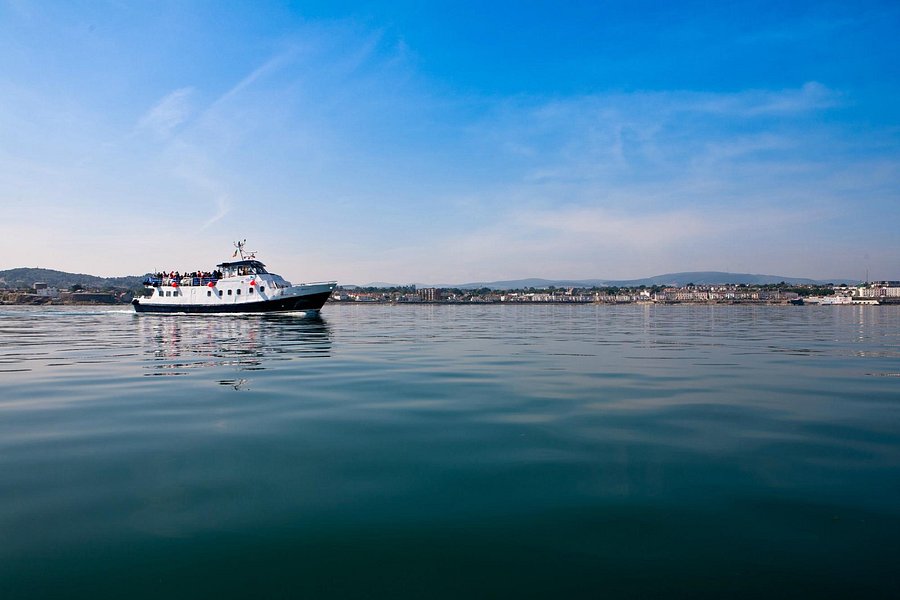
Boat Trip from Dublin City to Dun Laoghaire

Howth - Howth Cliffs & Ireland's Eye

1 Hour Boat Trip from Howth to Dun Laoghaire

Boat Trip from Dun Laoghaire to Howth
Most Recent: Reviews ordered by most recent publish date in descending order.
Detailed Reviews: Reviews ordered by recency and descriptiveness of user-identified themes such as waiting time, length of visit, general tips, and location information.
Dublin Bay Cruises - All You Need to Know BEFORE You Go (2024) - Tripadvisor

Dublin Bay Cruises Vouchers
€ 50,00 € 34,00
€34 instead of €50 for a choice of Dublin Bay cruise for two people, €48 for three people, or €60 for four people with Dublin Bay Cruises
- Description
- Reviews (1)
Deals for Dublin Bay Cruises Sightseeing Boat Tours
Buy Dublin Bay Cruises vouchers for deals on Sightseeing Tour on cruise ship in Dublin. With the sea wind on your face, the salt on your tongue, and views of the ravishing Irish coastline as far as the eye can sea, enjoy a treat for all the senses with Dublin Bay Cruises. Enjoy your choice of sea cruiseS. Choose to sail from Dun Laoghaire to the City Centre; from the City Centre to Dun Laoghaire or to Howth; from Howth to Dun Laoghaire; or from Howth to Howth Head and returning around Irelands Eye, and back to Howth Harbour. Keep your eyes peeled for possible sightings of grey seals and bottlenose dolphins, as well as thousands of seabirds. Sail through the history of Dublin Docklands as the East Link bridge opens up before you. Refreshments are available to purchase on board. A DART train voucher is included with your Dublin Bay Cruise booking confirmation, which entitles each passenger to travel between any station on the Dun Laoghaire/Howth/Dun Laoghaire DART route on the same day of sailing for a discounted price. Your vessel for the voyage is the St Bridget -- a 26-metre steel-hulled ship with a highly-trained crew.
Sir John Rogerson’s Quay, Samuel Beckett Bridge (in front of the Ferryman Bar & Hotel), Dublin 2.
1 review for Dublin Bay Cruises Vouchers
Out Family Trip – February 15, 2024
We did a trip in the Summer from Dun Laoghair to Howth for the day with the whole family. It was brilliant and the tour guide on the boat was very good.
Your email address will not be published. Required fields are marked *
Your review *
Save my name, email, and website in this browser for the next time I comment.
Related products

The Croke Park Hotel Vouchers
- Travel blog
- Hotel Reviews
- New Zealand
- South America
- South Pacific
- Theme Parks
- Car Rental Deals
- Flight Deals
- Hotel Deals
- Rewards Programs
- Sweepstakes

Coupon For Bridgewater, New Jersey Beerfest
Disney cruise black panther experience, great wolf lodge wisconsin dells promo code, coupon for margarita march bar crawl in washington, d.c., jet ski rental pompano beach fl discount code, jacksonville beach travel planning tips, celebrate cinco de mayo at a pool party in bossier city,…, barcelo aruba promo code, avanti palms resort and conference center orlando review.
- Vacation Spots
Dublin Bay Cruise Promo Code

If you click on the links in this post, we may earn money from the companies mentioned in this post, at no extra cost to you. You can read the full disclaimer here.
Sharing is caring!
Summer is quickly approaching, and it is time to start making holiday plans. One way to make your holiday very special is by taking a Dublin Bay Cruise!
Dublin Bay Cruises are a great choice for a Dublin excursion. After all, it once won the “Marine Tourism and Leisure Operator of the Year” at the Marine Industry Awards. So you know you’ll be in good hands!
Dublin Bay Cruises takes place on a St Bridget vessel. This is a 26-metre steel-hulled ship. Guests will be accompanied by a highly-trained crew.
Dublin Bay Cruises can be quite relaxing. You’ll get to take in the sea air and see the sights of Dublin around you.
And there are no guarantees of this of course, but you could also see spectacular animals such as bottlenose dolphins, grey seals, and seabirds.
To help add to the relaxing mood, too, you can purchase refreshments on board during the cruise.
There are multiple cruise destinations from which you can choose. All of these cruises take place at different times:
- Dun Laoghaire to Dublin City: 9:30 AM
- Dublin City to Dun Laoghaire: 11:00 AM
- Howth to Ireland’s Eye/Howth Cliffs Cruise: 2.15 PM
- Dun Laoighaire to Dalkey Island: 3.30 PM
- Howth to Dun Laoghaire: 3:45 PM
So take in Dublin Docklands’ history as the East Link bridge opens up before you while taking a Dublin Bay Cruise this summer.
If you would enjoy this excursion, then keep reading to find out how to save money with a great deal.
Perhaps you would like a promo code. But I suspect you would fancy an automatic discount without having to bother typing in a promo code or coupon code even more.
You can find this automatic discount here . You’ll save up to 32% on your ticket, and once again, no promo code will be needed.
EDITOR PICKS
Cheapest spring break flights 2024, seaworld orlando all day dining – is it worth it, savings on new orleans ghost, voodoo & vampire tour, popular posts, win a trip to the coachella music festival, save on the whisky extravaganza in houston, honolulu chinese new year 2023 guide, popular category.
- Vacation Spots 10948
- Savings 5657
- Hotel Deals 4801
- Trip Ideas 3935
- Sweepstakes 2045
- Theme Parks 1785
- Disclosure Policy
- Privacy & Terms
Dublin Bay Cruises
Take a beautiful boat ride and sail from the city to the beautiful seaside town of Dun Laoghaire and Howth. Book a boat ride and relax on board while you view Dublin from this unique perspective on beautiful Dublin Bay.
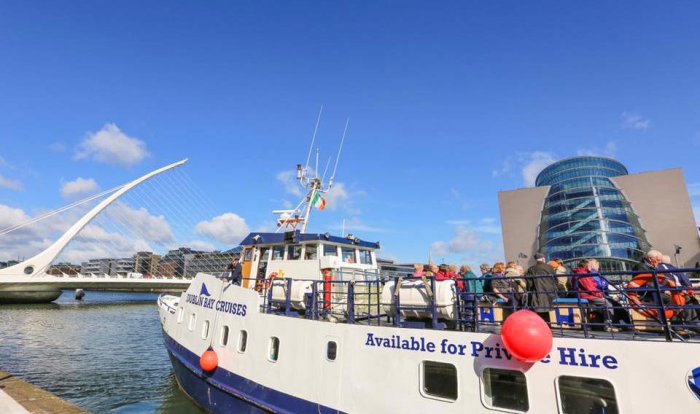
Dublin City to Dún Laoghaire
Join Dublin Bay Cruises as you travel along Dublin's beautiful coastline and head to Dún Laoghaire on this relaxing hour long cruise.

Dublin City to Howth
Escape the city and enjoy a cruise from Dublin City Centre to the beautiful village of Howth as you travel via Dun Laoghaire. You will see many beautiful things that you only can see on the water.
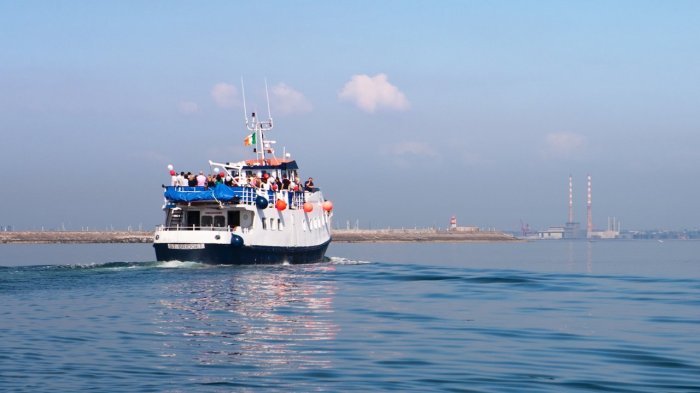
Dún Laoghaire to Howth
Embark on a scenic cruise from Dun Laoghaire to Howth with Dublin Bay Cruises. Take in gorgeous views such as Dalkey, Clontarf, Bull Island and much more.
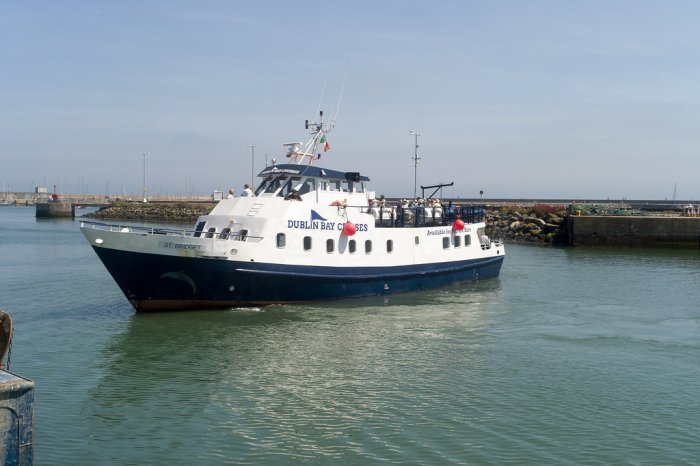
Howth to Dún Laoghaire
Book a cruise and head to Dún Laoghiare that departs from Howth and enjoy a relaxing time and take in all of the scenery that Irish coast has to offer on this hour-long journey.

Dún Laoghaire to Dublin City
Travel to Dublin City with a relaxing cruise as you sail from Dún Laoghaire along the beautful Dublin coast.

Ireland's Eye/Howth Cliffs Cruise
Set sail from Howth Harbour on the St. Bridget and take in the spectacular views of Ireland's Eye and Howth Cliffs.

Dún Laoghaire Dalkey Island Return
Take an enjoyable boat journey as you set sail on this hour long cruise from Dún Laoghaire and see many places including Dalkey Island before returning to Dún Laoghaire.
Dublin Bus
Close

Dublin Bay Cruises - Plan Your Trip
- Get a close-up view of some of Dublin Bay’s famous islands, towers, and wildlife!
- Experience one of Dublin Bay’s first tours!
- Make a super day out and begin at Howth, Dublin City, or Dun Laoghaire.
- See Ireland’s Eye, Dalkey Island, Poolbeg Chimneys, Dún Laoghaire Harbour, Martello Towers and Baily Lighthouse.
- Check out the full list of cruise options here .

DUBLIN BAY CRUISES - WHAT TO EXPECT
Enjoy one of Dublin’s best days out on a unique tour of Dublin Bay and the city's stunning coastline with Dublin Bay Cruises. Discover Dublin’s famous coastal sites and landmarks on-board the MV St. Bridget as you journey from your chosen starting location – you can choose from Dun Laoghaire Harbour, Howth Harbour, or Dublin City Centre.
In just a few years since beginning tours, Dublin Bay Cruises have quickly become one of the top things to do in Dublin and is a favourite among visitors and locals. You will see Dublin's best attractions and its beautiful seaside towns and villages. Sites that you will see include Dun Laoghaire Harbour, James Joyce Martello Tower, Dalkey Island, Killiney Bay, Baily lighthouse, Howth head, Ireland's Eye, Howth Harbour, Bull Wall, Bull Island, Dublin Port, East Link Bridge, and the changing Dublin Docklands.
DUBLIN BAY CRUISE ROUTES
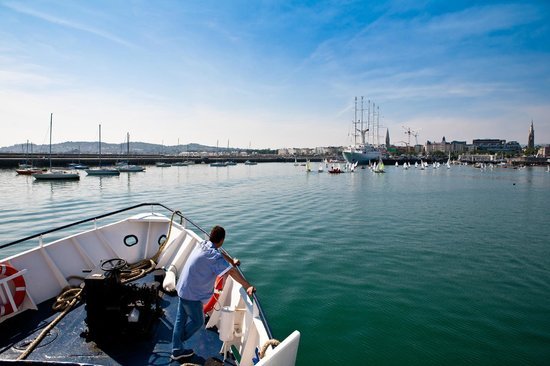
You can choose to start from Howth Harbour, Dublin City Centre, or Dun Laoghaire Harbour for your cruise.
The routes include;
- Dun Laoghaire to Dublin City
- Dublin City to Dun Laoghaire
- Dublin City to Howth via Dun Laoghaire
- Dun Laoghaire to Howth
- Howth to Dun Loaghaire
- Howth - Ireland's Eye - Howth
- Dun Laoghaire - Dalkey Island - Killiney Bay - Dun Laoghaire
DUBLIN BAY CRUISE TICKETS
For more information on Dublin Bay Cruise tickets, click here or visit dodublin.ie
With every ticket purchased, you will receive a discounted DART ticket, allowing you to return to your starting point. The Dart journey will cost €2 once you show your Dublin Bay Cruise voucher.
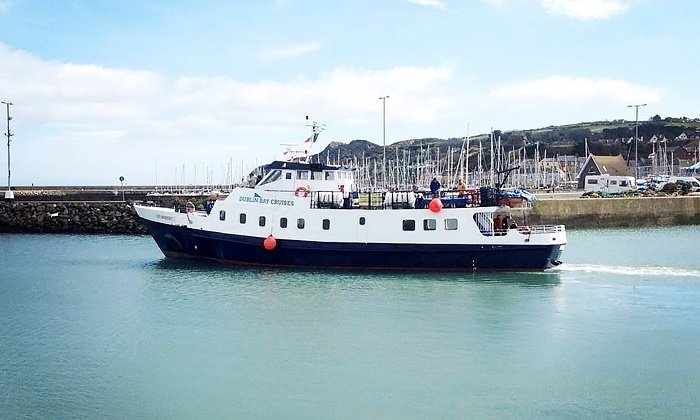

- Spring Sales

Dublin Bay Cruises Voucher Code
When you buy through links on AIVoucher we may earn a commission. Grab a 28% off markdown generally thanks to 12 active bargains. To read FAQs about Dublin Bay Cruises Voucher Code, scroll down to the bottom of the page.For more information, go to dublinbaycruises.com

Amazon Sale | Dublin Bay Cruises Voucher Code Deals
10% Off With Voucher Code
10% off Dublin Bay Sunset Cruise
Experience a breathtaking sunset from the water with a 10% discount on Dublin Bay Sunset Cruise. Perfect for romantic couples or peaceful solo travelers.

Special Dublin Bay Cruises Voucher Code Deals on eBbay
50% Off With Discount Code
50% off Dublin Bay Cruise Ticket
Get 50% off on Dublin Bay Cruise Ticket. Enjoy a scenic and unique perspective of Dublin city from the water.
30% Off With Code
Dublin Bay Cruise - Sail Away with 30% off
Sail away on a beautiful cruise along Dublin Bay with an amazing 30% discount. Relax, unwind and enjoy the stunning views.
25% Discount Promotion
25% discount on Dublin Bay Lunch Cruise
Enjoy a delicious lunch while cruising along Dublin Bay with a 25% discount. See stunning views of the coastline and enjoy great food!

Dublin Bay Cruises Voucher Code Special Promotion
Fresh Vouchers & Discount Codes for April 2024
Save money by using this offer code “SPRING”. Use this code at checkout to apply the discount automatically. Exclusions may apply.
Dublin Bay Cruises Voucher Code Exclusive Offer
New! Dublin Bay Cruises Voucher Code Discount Codes and Deals
Find savings via code “VOUCHER”. To redeem the offer, enter voucher code at checkout. Discount automatically applied in cart. Only valid at Dublin Bay Cruises Voucher Code.

Free Shipping Promo
Free shipping Your First Purchase at Dublin Bay Cruises Voucher Code
No voucher code needed.
Up To 30% Off + Closeout Sale
Select Clearance at Dublin Bay Cruises Voucher Code: Up to 30% Off
Save Extra 25% + Bundle Sales
Shop & Save Extra 25% with Dublin Bay Cruises Voucher Code Recommended Bundles

Special Offers at Dublin Bay Cruises Voucher Code
Voucher Alert for Dublin Bay Cruises Voucher Code
Thanks! You're now subscribed to AIVoucher.
Expired Dublin Bay Cruises Voucher Code Vouchers
30% Off Deal
Don't miss out! 30% Off on harbor tours
No voucher code needed. The offer is limited-time only.

Special Promo At Dublin Bay Cruises Voucher Code
Enjoy Up to 60% on maritime history
No voucher code needed. The offer will end in 2024-04-01.
Exclusive Deal At Dublin Bay Cruises Voucher Code
Save Big on island hopping
No voucher code needed. The offer will end in 2024-03-31.
10% Off Promo
Don't miss out! 10% Off on cruises
No voucher code needed. The offer will expire in 2024-03-27.
Up To 40% Off Deal
Up to 40% Off tourism
Dublin Bay Cruises Voucher Code Exclusive Discount
Enjoy 10% on coastal exploration
No voucher code needed. The offer will expire in 2024-02-29.
Save 10% Deal
Save 10% on sea adventure
No voucher code needed. The offer will end in 2024-02-26.
Up To 40% Off Sale
No voucher code needed. The offer will expire in 2024-02-26.
Dublin Bay Cruises Voucher Code 2024 Official Discount Codes & Vouchers
Find savings via promotion code “QUTNFARP”. To redeem the offer, enter voucher code at checkout. Discount automatically applied in cart. The offer will expire in 2024-02-08. Exclusions may apply.
15% Discount With Code
Dublin Bay Twilight Cruise - 15% discount
Enjoy an evening twilight cruise along Dublin Bay and see the city come alive at night. Get 15% off your ticket now!
Saving & Shopping

Top Dublin Bay Cruises Voucher Code Questions & Answers
Can you guide me through the process of redeeming discount codes on dublin bay cruises voucher code.
Our platform offers two types of discounts: promotional codes and deals. Place the discount code at the checkout and the discount will be instantly applied. Ensure the discount has been taken into consideration in the final bill before confirming the transaction.
Can You Explain Why My Dublin Bay Cruises Voucher Code Discount Code Isn't Working?
The most common explanations for why the Dublin Bay Cruises Voucher Code discount code might not be working include: certain exclusions, the code may have expired, or it may not be transferable or may only be used once. If a discount code doesn't work, you should check the expiration date and read the terms and conditions.
Are There Any Special Offers Or Promotions From Dublin Bay Cruises Voucher Code?
Get the best discounts by becoming a member of the Dublin Bay Cruises Voucher Code email list. Get notified of the most recent bargains and savings. Don't forget to add us to your favorites so you can get a surprise discount on your next order.
What Is The Most Direct Way To Contact Dublin Bay Cruises Voucher Code?
Most companies have a customer support team you can reach out to with any questions or concerns. Contact details can be found on the store's official website or social media profiles. Furthermore, many companies will provide a hotline.

Discount Information on Dublin Bay Cruises Voucher Code
Overall stats.
As of yesterday, AIVoucher brings 12 active bargains and savings regarding Dublin Bay Cruises Voucher Code altogether, which includes 0 cash back bargains, 1 half of the original price bargains, as well as 1 free shipping bargains. With an average markdown of 28% off, you can grab the top bargain of up to 50% off. All vouchers have been recently updated on April 01, 2024.
To gain more insight into company, click: dublinbaycruises.com
Please be aware that customers may provide Dublin Bay Cruises Voucher Code discount codes that may not work. Prices and availability of the deals may not be accurate and are subject to change without notice.
By shopping through links on AIVoucher, we may earn a commission. Thank you for your contribution. Learn More
About the Author
Linda jeasie.
Linda Jeasie is a writer and content editor with over a decade of experience covering consumer gadgets and mobile tech. Before going freelance, she got her start as an editor at MoneyGuide.com, a coupon and review website. These days she writes about gaming, life hacks, apps and software, and financial subjects for a variety of publications.

- Holiday Sales
graduate degree masters or phd
Have a language expert improve your writing.
Run a free plagiarism check in 10 minutes, generate accurate citations for free.
- Knowledge Base
- Applying to graduate school
- Master’s vs PhD | A Complete Guide to the Differences
Master's vs PhD | A Complete Guide to the Differences
Published on November 27, 2020 by Lauren Thomas . Revised on June 1, 2023.
The two most common types of graduate degrees are master’s and doctoral degrees:
- A master’s is a 1–2 year degree that can prepare you for a multitude of careers.
- A PhD, or doctoral degree, takes 3–7 years to complete (depending on the country) and prepares you for a career in academic research.
A master’s is also the necessary first step to a PhD. In the US, the master’s is built into PhD programs, while in most other countries, a separate master’s degree is required before applying for PhDs.
Master’s are far more common than PhDs. In the US, 24 million people have master’s or professional degrees, whereas only 4.5 million have doctorates.
Table of contents
Master’s vs phd at a glance, which is right for you, length of time required, career prospects, costs and salaries, application process, other interesting articles, frequently asked questions about master's and phd degrees.
The table below shows the key differences between the two.
Prevent plagiarism. Run a free check.
A PhD is right for you if:
- Your goal is to become a professor at a university or some other type of professional researcher.
- You love research and are passionate about discovering the answer to a particular question.
- You are willing to spend years pursuing your research even if you have to put up with a lot of dead ends and roadblocks.
A master’s degree is the better choice if any of the following apply:
- You want to continue studies in your field, but you’re not committed to a career as a professional researcher.
- You want to develop professional skills for a specific career.
- You are willing to pay a higher upfront cost if it means finishing with your degree (and thus being able to work) much faster.
- You want the option to study part-time while working.
The length of time required to complete a PhD or master’s degree varies. Unsurprisingly, PhDs take much longer, usually between 3–7 years. Master’s degrees are usually only 1–2 years.
Length of a master’s
Master’s degrees are usually 2 years, although 1-year master’s degrees also exist, mainly in the UK.
Most of the degree consists of classes and coursework, although many master’s programs include an intensive, semester-long master’s thesis or capstone project in which students bring together all they’ve learned to produce an original piece of work.
Length of a PhD
In the US, a PhD usually takes between 5 and 7 years to complete. The first 2 years are spent on coursework. Students, even those who choose to leave without finishing the program, usually receive a master’s degree at this point.
The next 3–5 years are spent preparing a dissertation —a lengthy piece of writing based on independent research, which aims to make a significant original contribution to one’s field.
Master’s degrees tend to prepare you for a career outside of academia, while PhDs are designed to lead to a career in research.
Careers for master’s graduates
There are two types of master’s degrees: terminal and research-intensive. The career prospects are different for each.
Terminal master’s degrees are intended to prepare students for careers outside of academia. Some degrees, known as professional degrees, specifically prepare students for particular professions; these include the Master of Public Policy (MPP), Master of Business Administration (MBA), Doctor of Physical Therapy (DPT), Master of Fine Arts (MFA), and Master of Public Health (MPH) degrees.
Other master’s degrees, usually Master of Arts (MA) or Master of Sciences (MS or MSc) degrees, do not necessarily lead to a specific career, but are intended to be a final degree. Examples include an MS in Communications or MS in Data Analytics.
In research-intensive master’s programs, students take coursework intended to prepare them for writing an original piece of research known as the master’s thesis . Such programs are usually intended to prepare for further study in a doctoral program.
Careers for PhD graduates
As research degrees, PhDs are usually intended to lead to an academic career. A PhD can be thought of like an apprenticeship, where students learn from professional researchers (academics) how to produce their own research.
Most students aspire to become a university professor upon the completion of their degree. However, careers in academia are highly competitive, and the skills learned in a doctoral program often lend themselves well to other types of careers.
Some graduates who find they prefer teaching to producing research go on to be teachers at liberal arts colleges or even secondary schools. Others work in research-intensive careers in the government, private sector, or at think tanks.
Below are a few examples of specific fields and non-academic careers that are common destinations of graduates of those fields.
Computer Science
- Lab Sciences
Many government jobs, including economists at a country’s central bank, are research-intensive and require a PhD. Think tanks also hire economists to carry out independent research.
In the private sector, economic consulting and technology firms frequently hire PhDs to solve real-world problems that require complex mathematical modeling.
Graduate students from the humanities are sometimes hired by museums, who can make use of their research and writing skills to curate exhibits and run public outreach.
Humanities PhDs are often well-suited to research and grant-writing roles at nonprofits. Since so much of research is funded by grants, PhD students often gain a lot of experience applying for them, which is a useful skill in the nonprofit sector.
There are a wide range of non-academic research jobs for lab scientists with doctorates in subjects like chemistry, biology, ecology and physics.
Many PhD graduates are hired by pharmaceutical companies that need to perform research to create and test their products. Government agencies, such as the Environmental Protection Agency (EPA), also hire lab scientists to work on research projects.
Job prospects after graduation vary widely based on the field. In fields like management, computer science, statistics, and economics, there’s little underemployment—even graduates from less well-known programs can easily find jobs that pay well and use the skills they’ve gained from the PhD.
However, in other fields, particularly in the humanities, many PhD graduates have difficulty in the job market. Unfortunately, there are far more PhD graduates than assistant professor roles, so many instead take on part-time and low-paid roles as adjunct instructors. Even non-academic careers can sometimes be difficult for PhDs to move into, as they may be seen as “overqualified” or as lacking in relevant professional experience.
Because career options post-PhD vary so much, you should take the time to figure out what the career prospects are in your field. Doctoral programs often have detailed “placement” records online in which they list the career outcomes of their graduates immediately upon leaving the program. If you can’t find these records, contact the program and ask for them—placement information should play an important role in your choice of PhD program.
Receive feedback on language, structure, and formatting
Professional editors proofread and edit your paper by focusing on:
- Academic style
- Vague sentences
- Style consistency
See an example

Although PhDs take far longer to complete, students often receive a living stipend in exchange for being a teaching or research assistant. Master’s degrees are shorter but less likely to be funded.
Both master’s degrees and PhDs lead to increased salaries upon graduation. While PhDs usually earn a bit more than those with a master’s degree, in some fields, the wages are identical, meaning that no financial benefit is gained from going on to a PhD.
Cost of a master’s
The upfront cost of a master’s degree is usually higher than a doctoral degree due to the lower amount of financial aid available. However, increased salaries also arrive faster than with a doctoral degree, because people graduate much earlier from a master’s program.
Some master’s students do receive stipends for their degrees, usually as compensation for being a teaching or research assistant. In addition, many people complete master’s degrees part time while working full-time, which allows them to fund their living costs as well as tuition.
The cost varies significantly by school and program. Public schools are usually cheaper than private ones. Some master’s degrees, such as MBAs, are notoriously expensive, but also result in much higher wages afterwards that make up for the high cost.
The master’s wage premium , or the extra amount that someone with a master’s degree makes than someone with just a high school diploma, is 23% on average. Many universities provide detailed statistics on the career and salary outcomes of their students. If they do not have this online, you should feel free to contact an administrator of the program and ask.
Cost of a PhD
PhDs, particularly outside the humanities, are usually (though not always) funded, meaning that tuition fees are fully waived and students receive a small living stipend. During the last 3–5 years of a PhD, after finishing their coursework (and sometimes before), students are usually expected to work as graduate instructors or research assistants in exchange for the stipend.
Sometimes students can apply for a fellowship (such as the National Science Foundation Graduate Research Program in the United States) that relieves them of any obligations to be a teaching or research assistant. Doctoral programs in the US tend to be better funded than in the rest of the world.
Sometimes, PhD degrees can be completed part-time, but this is rare. Students are usually expected to devote at least 40 hours a week to their research and work as teaching or research assistants.
The main cost of doctoral programs comes in the form of opportunity cost—all the years that students could be working a regular, full-time job, which usually pays much better than a graduate school stipend.
The average wage premium for PhDs is 26%, which is not much higher than the master’s degree premium.
In the US, the application process is similar for master’s and PhD programs. Both will generally ask for:
- At least one application essay, often called a personal statement or statement of purpose .
- Letters of recommendation .
- A resume or CV .
- Transcripts.
- Writing samples.
Applications for both types of programs also often require a standardized test. PhDs usually require the Graduate Record Examination (GRE), which tries to measure verbal reasoning, quantitative, critical thinking , and analytical writing skills. Many master’s programs require this test as well.
Applying for a master’s
Master’s degrees programs will often ask you to respond to specific essay prompts that may ask you to reflect upon not just your academic background, but also your personal character and future career ambitions.
Northwestern University’s Kellogg Business School requires Master’s of Business Administration (MBA) applicants write two essays, one about a recent time they demonstrated leadership and the second about their personal values.
Who you should ask for your letters of recommendation varies by program. If you are applying to a research-intensive master’s program, then you should choose former professors or research supervisors. For other programs, particularly business school, current work supervisors may be a better choice.
Some professional master’s programs require a specific test. For example, to apply to law school, you must take the Law School Admissions Test, or LSAT. For business school, you must take either the GRE or the Graduate Management Admissions Test (GMAT).
Applying for a PhD
When applying for a PhD, your resume should focus more on your research background—you should especially emphasize any publications you’ve authored or presentations that you’ve given.
Similarly, your statement of purpose should discuss research that you’ve participated in, whether as an assistant or the lead author. You should detail what exactly you did in projects you’ve contributed to, whether that’s conducting a literature review, coding regressions, or writing an entire article.
Your letters of recommendations should be from former professors or supervisors who can speak to your abilities and potential as a researcher. A good rule of thumb is to avoid asking for recommendations from anyone who does not themselves have a PhD.
If you want to know more about college essays , academic writing , and AI tools , make sure to check out some of our other language articles with explanations, examples, and quizzes.
College essays
- College essay examples
- College essay format
- College essay style
- College essay length
- Diversity essays
- Scholarship essays
Academic writing
- Writing process
- Avoiding repetition
- Literature review
- Conceptual framework
- Dissertation outline
- Thesis acknowledgements
- Burned or burnt
- Canceled or cancelled
- Dreamt or dreamed
- Gray or grey
- Theater vs theatre
A master’s is a 1- or 2-year graduate degree that can prepare you for a variety of careers.
All master’s involve graduate-level coursework. Some are research-intensive and intend to prepare students for further study in a PhD; these usually require their students to write a master’s thesis . Others focus on professional training for a specific career.
A PhD, which is short for philosophiae doctor (doctor of philosophy in Latin), is the highest university degree that can be obtained. In a PhD, students spend 3–5 years writing a dissertation , which aims to make a significant, original contribution to current knowledge.
A PhD is intended to prepare students for a career as a researcher, whether that be in academia, the public sector, or the private sector.
This depends on the country. In the United States, you can generally go directly to a PhD with only a bachelor’s degree, as a master’s program is included as part of the doctoral program.
Elsewhere, you generally need to graduate from a research-intensive master’s degree before continuing to the PhD.
This varies by country. In the United States, PhDs usually take between 5–7 years: 2 years of coursework followed by 3–5 years of independent research work to produce a dissertation.
In the rest of the world, students normally have a master’s degree before beginning the PhD, so they proceed directly to the research stage and complete a PhD in 3–5 years.
A master’s degree usually has a higher upfront cost, but it also allows you to start earning a higher salary more quickly. The exact cost depends on the country and the school: private universities usually cost more than public ones, and European degrees usually cost less than North American ones. There are limited possibilities for financial aid.
PhDs often waive tuition fees and offer a living stipend in exchange for a teaching or research assistantship. However, they take many years to complete, during which time you earn very little.
In the US, the graduate school application process is similar whether you’re applying for a master’s or a PhD . Both require letters of recommendation , a statement of purpose or personal statement , a resume or CV , and transcripts. Programs in the US and Canada usually also require a certain type of standardized test—often the GRE.
Outside the US, PhD programs usually also require applicants to write a research proposal , because students are expected to begin dissertation research in the first year of their PhD.
Cite this Scribbr article
If you want to cite this source, you can copy and paste the citation or click the “Cite this Scribbr article” button to automatically add the citation to our free Citation Generator.
Thomas, L. (2023, June 01). Master's vs PhD | A Complete Guide to the Differences. Scribbr. Retrieved April 15, 2024, from https://www.scribbr.com/graduate-school/masters-vs-phd/
Is this article helpful?

Lauren Thomas
Other students also liked, when to apply for graduate school | month-by-month timeline, how to write a statement of purpose | example, how to write a graduate school resume | template & example, unlimited academic ai-proofreading.
✔ Document error-free in 5minutes ✔ Unlimited document corrections ✔ Specialized in correcting academic texts
Graduate Journey Resource Center
Discover valuable resources to assist you in your program search and decision-making process.

Master’s vs. Ph.D.: What’s the Difference and Which One to Choose?
If graduate school is on your radar, one of the first things to consider is what type of degree you should pursue . While a bachelor’s degree is required for any postgraduate study, many people think you need a master’s to pursue a Ph.D., but that isn’t always the case. While there are benefits to receiving your master’s degree before your Ph.D., it’s not always necessary or required. However, there are important differences to note when deciding which type of program to apply to.
Master’s degree
A master’s degree usually takes about two years to complete full time. There are programs that allow a student to attend on a part-time basis, but that of course extends the completion time. Many master’s programs require a thesis to be completed, but not all. A thesis is a research project that is completed during the final year of a master’s program under the guidance of your program chair or advisor.
Under the master’s umbrella, there are quite a few specific degrees you can obtain. Your professional path will determine which of these you pursue.
- Master of Arts (MA) is given for disciplines in the arts and social sciences.
- Master of Science (MS) is given for sciences, health, engineering and statistics.
- Master of Research (MRes) is focused on training students to become researchers. This is advantageous to a student if they’re pursuing a research-based career or planning to apply for a Ph.D. program.
- Master by Research (MPhil) is similar to a MRes but is more advanced and focuses on research topics to be explored in depth. It’s often considered a precursor to a Ph.D. program.
Specialized master’s degrees
There are numerous specialized master’s degrees that are categorized by profession. These are often (not always) preceded by some professional experience prior to undertaking these types of advanced degrees.
- Master of Business Administration (MBA)
- Master of Library Science (MLS, MLIS, MSLS)
- Master of Public Administration (MPA)
- Master of Public Health (MPH)
- Master of Social Work (MSW)
- Master of Laws (LLM)
- Master of Education (MEd, MSEd, MIT, MAEd, MAT)
- Master of Engineering (MEng)
- Master of Architecture (MArch)
- Master of Fine Arts (MFA)
- Master of Divinity (MDiv)
Ph.D. (Doctor of Philosophy)
There are many Ph.D. programs and, in general, it’s considered the most advanced type of research degree you can obtain. Ph.D. candidates are required to complete a dissertation to obtain their degree. Unlike a thesis, a dissertation is longer and consists of original research conducted throughout the entire doctoral study. In some cases, students may be awarded a stipend, or pay, to complete the doctoral program and dissertation.
Ph.D.’s take a considerably longer time to complete than a master’s, five to eight years on average, and they carry a rather high rate of noncompletion due to time and financial commitments. Many Ph.D. programs have stipends available, so it’s important to inquire about that when researching a particular program.
Specialized doctorate programs
As with master’s degrees, there are several specialized doctorate programs specific to different disciplines and areas of study:
- Doctor of Business Administration (DBA)
- Doctor of Engineering (EngD/PhD)
- Doctor of Education (EdD/D.Ed)
- Doctor of Social Science (DsocSci)
- Doctor of Professional Studies (DProf)
- Doctor of Architecture (DArch)
- Doctor of Theology (Th.D)
- Doctor of Divinity (DD/DDiv)
- Doctor of Science STEM (Dsc/ScD)
- Doctor of Science Arts & Humanities (DLitt/LitD)
When deciding which one to get, consider your immediate or long-term career goals — which degree would serve you best? In some cases, you can obtain a Ph.D. with just a bachelor’s degree, but often it’s recommended you get a master’s first for the research experience that will be required for a Ph.D.
As with anything, there are exceptions. Students in law school obtain a J.D. (Juris Doctor) but can then further obtain a master’s in a sub-specialty like tax or immigration law. The health care occupations of physical therapist and pharmacist are also doctorate programs obtained post undergrad.
Making your choice
As with any decision, weigh your options, list pros and cons, and go from there. Once you’ve narrowed your options , you’ll have a precise list of programs and institutions generated for your specific goals.
- Skip to main content
- Prospective Students
- Current Students
- Apply Apply
- Follow Us

Demystifying Graduate Degrees: Comparing Master’s vs. Doctorate

You want a graduate degree — to continue exploring your passions, make discoveries or advance your career — but how do you turn that decision into a plan?
It starts with understanding the difference between a master’s and a PhD in your field. They differ in length, intensity, curriculum and career paths, so you’ll also need a clear idea of why you want to pursue a graduate degree to determine which one you should get.
What Is a Master’s Degree?
If you’ve completed your undergraduate degree, it might be time to ask, “What’s next?”
That’s where Master’s degrees can come in.
Whether you want to specialize in a particular area or get advanced skills in your profession, a master’s degree can help you get there in 1-2 years.
The most common types of master's degrees include:
- Master of Arts (MA),
- Master of Science (MS),
- Master of Business Administration (MBA),
- Master of Education (MEd),
- and Master of Fine Arts (MFA).
What do you learn in a master’s program?
The short answer? A lot.
Master’s degree programs are designed to build on the foundational knowledge gained during your undergraduate studies, and the curriculum focuses on advanced knowledge and skills in a particular field.
Here’s what you can expect to encounter in a master’s program:
Advanced coursework: Master's programs provide advanced courses that build upon the foundational knowledge gained during your undergraduate studies. These courses delve deeper into specific topics within your field and often explore the latest research and developments.
Specialization: One of the primary goals of a master's program is to allow you to specialize in a particular area. Whether pursuing a Master of Arts, Master of Science, or a professional degree like an MBA, you can focus your studies on a specific subfield or concentration within your discipline.
Research and analysis: Many master's programs require you to engage in research projects and analytical work. This could involve conducting independent research under the guidance of a faculty advisor or participating in group research projects with fellow students. Through these research experiences, you’ll develop critical thinking and analytical skills, learn how to gather and evaluate relevant data and draw meaningful conclusions.
Practical applications and internships: Some master's programs incorporate practical training opportunities like internships, practicums, or field experiences; hands-on experiences allow you to apply the knowledge and skills gained in the classroom to real-world settings.
Collaboration and networking: A Master's program is a rich collaboration and networking environment. Collaborative projects, group discussions, and professional events allow you to exchange ideas and build connections within your field, often leading to long-lasting professional relationships and potential career opportunities.
Thesis project: Outside of building skills like project management, problem-solving, project management, and effective communication, thesis projects in master's degree programs serve as a cornerstone for building advanced skills, expanding professional networks, and contributing to the body of knowledge in your respective field.
Why get a master’s degree?
Career advancement: One primary advantage of getting a master’s degree is an edge in the job market. Employers value the specialized knowledge and advanced skills that come with a master’s degree, opening up new and exciting career opportunities. The cherry on top? Individuals with a master’s degree often earn more than those without an advanced degree — you can take that to the bank, especially if you set yourself up for financial success during your studies. Flexibility: Another aspect to consider is the flexibility that a master’s degree offers. Many programs offer part-time or online options, allowing you to balance your studies with work or other commitments. This flexibility can be particularly helpful if you’re already established in your career but want to gain additional qualifications. Growth opportunities: Depending on your field, a master’s degree can be a stepping stone toward a PhD or other doctoral programs. It gives you a solid foundation in research methods and academic rigor — a boon if you want to pursue a career in academia or conduct advanced research.
What is a Doctoral Degree or PhD?
A doctoral degree is a terminal degree — it represents the pinnacle of academic achievement and is the most advanced degree you can attain. Doctoral students want to become authorities in their chosen fields and develop the skills to conduct independent and original research.
Doctoral programs usually span 3-6 years of full-time study, during which students complete advanced coursework, pass comprehensive examinations, engage in extensive research and ultimately produce a dissertation that contributes new knowledge to the field.
There are several types of doctoral degrees based on different academic and professional aspirations, including:
- Doctor of Philosophy (PhD),
- Doctor of Education (EdD),
- And Doctor of Psychology (PsyD), among others.
What do you learn in a doctoral program?
When you successfully defend your dissertation and complete your degree, you also become an expert in your field — but it doesn’t happen overnight. Here's what you can expect to encounter in a doctoral program:
Advanced research: If you’re looking for a hard emphasis on research, a doctoral program is the place to be. Over several years, PhD students engage in extensive research activities — including conducting independent research, producing scholarly publications, and contributing to the knowledge base of their field through original research contributions.
Theoretical and conceptual frameworks: PhDs are an incredible opportunity to deepen your understanding of theoretical and conceptual frameworks in your field of study. You'll critically analyze existing theories, evaluate their applicability, and develop your theoretical frameworks to advance knowledge and understanding in your chosen area of research.
Advanced methodological training: Because a dissertation is an original research project, you’ll gain advanced training in research methodologies and data analysis techniques, like designing robust research studies, collecting and analyzing data, and drawing valid and reliable conclusions from your research findings.
Critical thinking and intellectual independence: Both academia and industry employers highly value independent thinkers and workers. Doctoral programs foster critical thinking and intellectual independence by challenging you to evaluate existing research, identify gaps in knowledge, and propose innovative research ideas. Teaching and Mentoring Experience: Being a teacher or mentor is a great opportunity to share your hard-earned knowledge, and universities agree. Doctoral programs often provide opportunities to teach and mentor undergraduate students, develop effective pedagogical skills, and contribute to the academic community.
Dissertation project: Your dissertation is the culmination of years of hard work within your field. By enrolling in a doctoral program, you’re also given the chance to participate in a significant and original research endeavor that demonstrates the expertise you’ve worked so hard to cultivate.
Why Get a Doctorate?
Having a doctorate doesn’t just open doors; it can kick them down. A doctorate might be right for you if you’re looking for a door to these things:
Expertise and specialization: Doctoral degrees can be a labor of love. They help you delve deeper into a specific subject area, gaining expertise and specialization.
Research opportunities: Extensive research training, opportunities for conducting original research, and contributing new knowledge to the academic community — these three things make a doctorate coveted by students, universities, and employers.
Salary potential and career advancement: In some fields, having a doctorate can lead to higher earning potential and increased salary opportunities. According to the U.S. Bureau of Labor Statistics , doctoral degree holders made an average of $1,885 per week in 2020, while master’s degree holders made an average of $1,545 per week.
Contribution to society: Doctoral research often addresses pressing societal issues, contributing to advancements in technology, healthcare, education, and other areas for the benefit of society — for many students, contributing to the greater good is just as rewarding as career advancement or personal development.
What’s the difference between a dissertation and a thesis?
You might have heard “thesis” and “dissertation” used interchangeably, but they’re not quite the same. Here are the general distinctions to consider:
- A thesis is usually associated with a master's degree program. Students undertake a research project in the final stage of their degree.
- It typically involves conducting original research or analyzing existing research to answer a specific research question.
- The length of a thesis varies based on the field and program requirements, but it’s usually shorter than a dissertation.
Dissertation:
- A dissertation is typically associated with a doctoral degree program. It is an extensive, in-depth research project that marks the culmination of a doctoral program.
- in-depth exploration of a research topic
- comprehensive literature review
- methodology section
- data collection and analysis
- substantive discussion of findings and conclusions.
- Dissertations are usually longer than theses and may take several years to complete.
- Once you’ve completed your dissertation, you participate in a formal defense of the research, where you’ll present your findings to a committee of experts in the field.
Key Differences: Master's vs. PhD
Deciding between master's vs. phd programs.
“Should I get a master’s degree or a PhD?”
Answering that question can be exciting — and a bit intimidating. You must consider long-term career objectives, personal interests, and the time you can commit. Plus, the level of specialization you wish to achieve based on your career path is also a factor. Typically, a PhD is a prerequisite for those aspiring to research careers in academia, while professional roles in various industries may require only a master's degree.
It’s still worth noting that students have the option of completing a master's degree first and then, based on their experiences and career aspirations, deciding whether to pursue a PhD.
Find the right graduate degree at SMU
A graduate degree is a big investment, so investing in the right program is important.
SMU offers a diverse array of master's and PhD programs tailored to align with your unique interests and career goals, and personalized support, from the applicant to the graduate, is always available.
Whether you're interested in pursuing a PhD in Chemistry or are almost finished with your MBA, we can help you find the right advanced degree.
This could just be the beginning of your journey. Get a closer look at applying to graduate programs of your choice with our guide, How to Get a PhD: A Guide to Choosing and Applying to PhD Programs .

Learn More About
Doctoral degrees at SMU, and how you can choose the right program and thrive in it, in our Guide to Getting a PhD.

Request more
Information.
Complete the form to reach out to us for more information
Published On
More articles, recommended articles for you, is a master's in education worth it for teachers.
If you’re considering returning to the student side of the classroom and pursuing a graduate degree...
Is a Master’s in Economics Worth It?
If you’re contemplating a career in economics, you might be wondering if a master’s degree in the...
5 Jobs You Can Do with a Master’s in Higher Education that Spark Joy
Finding joy in your career is essential for personal fulfillment and overall happiness. When you...
Browse articles by topic
Subscribe to.
Should I Pursue A Master’s or A Ph.D.?

The first step in deciding on the right graduate program for you is to figure out which degree will best serve you—a master’s or a doctor of philosophy (Ph.D.). Here are a few factors to consider.
What are your career goals?
- Professional master’s: A good choice if you want to develop a particular skill set in order to practice a particular profession. This type of degree provides coursework focused on learning and practicing skills.
- Research master’s: A good fit if you want to gain expertise in a discipline and know how to teach it. A research master’s typically includes a research project or thesis and comprehensive exams in addition to coursework and provides experience in research and scholarship.
- Ph.D. (doctor of philosophy): Consider this option if your goal is to ground yourself in a body of research and develop the ability to add to that body of knowledge. Ph.D. study includes a major research project in addition to coursework, and a Ph.D. is the highest scholastic degree awarded by American universities. Contrary to common perception, career paths for Ph.D. graduates are quite varied, not just limited to academia. Ph.D. training helps you hones skills such as writing, research, teaching, data analysis, communicating complex topics—all of which can translate into many sectors, including industry, government, nonprofit, and entrepreneurship.
See career data for Duke graduate programs' alumni
How much time do you have to pursue a graduate degree?
Master’s degrees typically take two years to complete, while Ph.D. programs generally take five to seven years ( see Duke programs' time-to-degree ). That is a significant difference in commitment and opportunity costs. It might also play a key role in deciding which factors take higher priority as you evaluate a program. How does the length of the program fit with your career and family plans? How important is the surrounding community if you are going to be there for seven years instead of two? How long are you able or willing to go on a limited income while in graduate school?
How much can you afford to pay for a graduate degree?
Consider your personal financial situation (e.g., how much savings and student loans do you have), as well as how much financial aid you can get. Master’s and Ph.D. programs differ greatly in the amount of financial aid available. Ph.D. programs tend to offer significantly more financial support than master’s programs (but often will have research or teaching requirements).
A typical Ph.D. financial aid package usually includes coverage of tuition and fees, a living stipend, and some level of support for health insurance for a set number of years. For instance, Duke’s standard Ph.D. package covers tuition, mandatory fees, and a stipend for five years, as well as health insurance premiums for six years.
Within an institution, the level of financial support often differs across programs, so be sure to ask your specific program about the financial aid it offers. There are also many national organizations that provide competitive fellowships and scholarships for graduate students.
Know which degree you want to pursue? Here are some key things to look for in a program .

Popular searches
Land your dream job, the difference between a masters and a doctorate.

There are a lot of degree types out there. Many fall into one of two camps: doctorates and master’s degrees. Both graduate degrees offer a narrower educational focus than the undergraduate experience. The higher the degree, the longer it takes to earn and the more specialized is its focus. We’re taking a closer look at the master’s and doctorate degrees to highlight differences and help you determine which might be most useful to you.
Master’s Degrees
Master’s degrees are more versatile than doctoral degrees, and have a wide range of professional and academic applications. The most common master’s degrees are Master’s of Arts (M.A.) and Master’s of Science (M.S.) . Additionally, there are three types of master’s programs:
- Research Master’s degrees are typically for academic and applied research disciplines. Examples include a Master’s of Arts in Comparative Literature, and Master’s of Science in Biology. In some fields, earning a research master’s degree without going on to earn a Ph.D. restricts your professional options. Figure out what's best for you and your career trajectory by talking with professors or professionals in your field.
- Professional Master’s degrees prepare candidates for professional work by introducing practical skills and frameworks for understanding issues in their field. These degrees may also qualify a person to practice in their field. Examples include a Master’s of Social Work, Master’s of Architecture, or Master’s of Art in Teaching. Most of the degrees featured at Idealist Grad Fairs are professional master’s degrees supporting careers in the social good sector.
- Terminal Master’s degrees are the highest academic degree in their field. While some master’s degrees may serve as the first step towards a doctorate, others—such as a Master’s of Fine Arts in Creative Writing or a Master’s in Library Science—are as high as you can go for academic accreditation in those fields of study.
Before pursuing a master’s degree, candidates must have already earned a bachelor's degree. Master’s programs take one to three years to complete and consist of advanced-level courses and seminars. In some programs, students go on to research, write, and defend a master’s thesis. In professional master’s programs, the thesis is often replaced by final projects and exams.
Doctoral Degrees
The most common doctorate is the Doctor of Philosophy or PhD. These research doctorates prepare students to contribute to the collective knowledge base of the field and offers a unique opportunity for an individual to conduct intensive and prolonged research on a very particular topic, which often leads to publication. With a PhD, many seek careers as professors and researchers, but may also pursue roles in the nonprofit, public, and private sectors. Additionally, there are professional doctorates like the MD (Medical Doctor), and the JD (Juris Doctor). Before pursuing a doctorate, candidates must have already earned a bachelor's degree and in some cases a master’s depending on the program. Due to the nature of specialization, PhD programs tend to be smaller than master’s programs.
PhD candidates begin by taking courses and exams. They go on to take advanced seminars and complete their requirements by researching, writing, and defending a dissertation. A dissertation is one of the central components of earning the PhD and is a doctoral-level thesis about the candidate’s original research. A doctorate degree may take up to eight years to earn depending on the program, whether the candidate has already completed a master’s degree (or is coming straight from undergraduate), and the amount of time it takes to complete the dissertation.
Dual Degree Programs or Joint Master’s and PhD Programs
If you decide both degree programs sound right for you, there are some programs that offer the option to pursue both degrees at the same time. A dual degree program allows you to double count your earned credits towards the completion of both degrees. You can find more information here .
How to decide which degree is right for you?
Figuring out whether to pursue a master's or PhD will depend on your career field and educational goals. You can learn more about requirements in your field by doing some research or your own as well as networking with colleagues. Reaching out to a mentor in the field or alumni from your preferred program can also help you navigate graduate school decisions. Additionally, speaking with admissions staff at graduate schools can help provide insight into the kinds of graduate programming available.
It can be tricky to offer general guidance on graduate programs since so much is dependent on the field of study. That said, we wanted to offer examples of how master’s and doctorate degrees can set you up for success. We've selected social work and business as fields to illustrate this:
Social Work
If you want to go to graduate school to study social work, you can study at the master’s level or the PhD level. To determine what is best for you, consider what role you’d like to play in the field of social work. If you’d like to be a social welfare direct service provider or government agency administrator, a master’s program may be most appropriate. If you’d like to become a faculty member at a post-secondary institution, a social welfare research scholar, or a social welfare policy analyst, a Ph.D. program will be a better fit. Outside of academic settings—where a doctorate is required for most faculty positions—a master’s combined with practical work experience may provide ample preparation for a career as a researcher, policy analyst, or mid-level manager.
For business administration, you have the option of a Master’s of Business Administration (MBA), or a Doctorate of Business Administration (DBA). If your long term goal is to take on a leadership role in a nonprofit or business enterprise, the MBA (or nonprofit management degree) may be best. If instead, you’re interested in a career in academia teaching and researching on business practices, the DBA will be the better option.
Knowing your professional goals will help guide your choices for graduate study. Certain career paths, such as becoming a public defender or a medical doctor, are more clearly marked with the necessary steps, including the required educational level and graduate degree. Other career paths are less regimented and therefore require more investigation and consideration of what is right for you. Thoroughly researching your field of interest and having a strong understanding of the skills and knowledge you want and need from your graduate education will inform which degree options make the most sense for your goals.
Planning on returning to school? Check out our Grad School Resources . And if you’re interested in speaking with an admissions representative, find out which cities near you are hosting an Idealist Grad School Fair this fall.

Tips for Online Students , Tips for Students
Master’s vs PhD — These are the Main Differences
Updated: July 18, 2022
Published: October 31, 2019

The consideration between earning a master’s vs PhD is not always an easy choice. While many careers and personal aspirations may be complete with just an undergraduate degree (Associate’s or Bachelor’s), a lot of people continue their higher education to obtain graduate degrees. These include a master’s and/or a PhD.
Neither a master’s degree nor a PhD is considered to be a walk in the park. Therefore, it’s useful to understand why you would earn either and then decide how far to go.

Photo by Good Free Photos on Unsplash
Definitions: master’s vs phd.
Bost a master’s and PhD are defined as postgraduate degrees, but they require different commitments and styles of learning.

1. Master’s Degree:
Mostly all master’s degrees will require the completion of an undergraduate bachelor’s degree to enroll. They generally all share the same common requirement for a thesis or dissertation to graduate.
Earning a master’s degree through a taught program will result in the completion of a Master of Art (MA), Master of Science (MS), or Master of Philosophy (MPhil). For those who earn their master’s degree through research, they will earn a Master of Research (Mre), in a tailored field of study. There are also degree-specific master’s programs like Master of Business Administration (MBA) and Master of Education (M.Ed).
After earning a master’s degree, the next step is a PhD, which entails both working and performing research at an institution. A PhD is an abbreviation for “Doctor of Philosophy.” It is the highest academic degree one can achieve. As such, it is a time-consuming pursuit that requires a lot of studying and research.
You may be wondering, “Do you need a master’s to get a PhD?”
Technically, the answer is not always. Some students skip a master’s and go straight for their PhD, but they may lack research experience. While it could save money, the transition between a bachelor’s and a PhD is incredibly sharp. It may be harder to complete a PhD without the experience from a master’s.
Yet, some institutions may allow for the possibility to earn both your master’s and PhD in conjunction with one another. This will alleviate the transition between skipping a master’s and going straight to earning a PhD.
Should You Get a Master’s or PhD?
There are many considerations to factor when deciding between a master’s of PhD. For starters, it’s useful to consider the amount of time it will take, the cost, and the benefits and disadvantages of each. It is also of utmost importance to explore your own personal goals and reasons for wanting a graduate degree.
If your desired career of choice requires a PhD, like becoming a university professor, then you have your answer. If you want to start a business and benefit by networking while in school, a Master of Business Administration (MBA) could be a good idea. Consider what you want to pursue as a career and find out the requirements first.
Another useful thing to note is that a master’s degree can be used for a shift in careers. For example, if you attended college and earned a bachelor’s degree in humanities, but now you want to pursue science, you can still earn your master’s degree in a scientific discipline. On the other hand, a PhD is tailored to your field of study and specialty, so it will require that you are sure of your direction when you first earn your master’s degree.
Length of Time
A typical master’s degree program takes about two years full-time. However, there are accelerated programs that can be completed in just a year or so.
A PhD, in general, requires five to six years of studying, teaching, and research. However, it may even take some students up to eight or nine years to graduate. With this significant investment in time, it’s necessary to know if a PhD is right for you before starting.
The cost of both programs varies by institution and enrollment status of part-time versus full-time. However, since a PhD takes longer to complete, it will end up costing more. With that said, if you look into your return on investment, a PhD could end up yielding a higher salary, and therefore end up “costing less.”
Additionally, there is also the possibility of being paid to complete your PhD. Some students may receive an academic stipend, a university fellowship or apprenticeship or a reduced fee to earn their PhD while completing research (or teaching) at an institution. It’s also possible to get financial aid through a scholarship or grant.
As tuition rates continue to rise, it’s useful to look into alternative institutions for affordable education. For example, the University of the People offers a tuition-free master’s program in Business Administration and Education. This means you can study 100% online and graduate for less than the cost of most programs.
Weighing the Benefits
When comparing the two degree types, here are some benefits of each:
- Career-oriented
- Can open the door for more job opportunities
- Costs less than a PhD
- Takes less time than a PhD
- Helps you stand out from those with only an undergraduate degree
- You can perform research in your field of choice
- You become an expert in your field
- The prefix Dr. is added to your name
- You can teach in academia at the highest level
Required Commitment and Reasons to Pursue
Both a master’s and a PhD require a huge amount of hard work and utter commitment. You must be dedicated and motivated to complete either degree. Since most careers only may require a bachelor’s degree, having a master’s or PhD will set you apart from the competition. However, this should not be the sole reason to pursue either.
You may be wondering why would you earn either degree. Here’s a look at some motivational factors:
Reasons to Study for a Master’s
- Your career requires it (see next section)
- You want to advance your subject knowledge
- You want to experience graduate school and network with peers
Reasons to Study for a PhD
- You want to contribute new research to your field of choice
- Your career requires a PhD
- You want to earn the title of Dr.

Photo by Online Marketing on Unsplash
Required degrees by career.
Most people are motivated to pursue higher education because their desired careers require they do so. Here, we will break down those fields that require the completion of a master’s degree as it’s high on the list of reasons why to get one.
- Education Administration: To work as an administrator in an educational institution, you need to hold an advanced degree. A Master’s in Education (M.Ed) will provide you with the necessary knowledge and required skills to succeed in the field.
- Executive Level Business: A Master’s in Business (MBA) will not only place you ahead of the competition to land high-level positions in the field of business, but it can also be the jumping off point for becoming your own boss.
- Environmental Science: With issues in climate change and technological advancement, careers in Environmental Science are growing. As with most scientific careers, it requires a master’s degree where you will learn Applied Ecology, Environmental Policy, Environmental Chemistry, and more.
- Mental Health: To become a licensed practitioner and assist in mental health counseling, you will continue your education through a master’s degree in the field.
- Physical Therapy: Employers of physical therapists often prefer them to obtain a master’s degree in the discipline as the field is highly specialized.
Of course, some careers require a PhD. These careers are easy to spot because they have the prefix Dr. in front of them or the suffix like J.D. (Juris Doctor). To become a lawyer, doctor of medicine, veterinary medicine or psychologist/psychiatrist, you must obtain a PhD in the respective field.
Salary Differences Between Master’s and Ph.D. Graduates
According to a study performed by the Georgetown University Center on Education and the Workforce , the overall evidence shows that the higher the degree you have, the higher your salary potential. However, the differences vary by subject level and field.
In general, the expected lifetime earnings of those with each degree level is as follows:
- High School Diploma: $973,000
- Bachelor’s Degree: $1.3 million
- Master’s Degree: $2.7 million
- Doctorate Degree: $3.3 million
The Bottom Line
Aside from the financial cost and length of time, the opportunity to earn a master’s and a doctorate degree can offer several benefits.
However, it is an undertaking that requires a lot of dedication and motivation on behalf of the student. As such, it’s important to perform research on your desired career’s requirements, as well as your personal interest in pursuing either a Phd vs master’s.
Related Articles
Login or sign up to be automatically entered into our next $10,000 scholarship giveaway
Get Searching
- College Search
- College Search Map
- Graduate Programs
- Featured Colleges
- Scholarship Search
- Lists & Rankings
Articles & Advice
- Ask the Experts
- Campus Visits
- Catholic Colleges and Universities
- Christian Colleges and Universities
- College Admission
- College Athletics
- College Diversity
- Counselors and Consultants
- Education and Teaching
- Financial Aid
- Graduate School
- Health and Medicine
International Students
- Internships and Careers
- Majors and Academics
- Performing and Visual Arts
- Public Colleges and Universities
- Science and Engineering
- Student Life
- Transfer Students
- Why CollegeXpress
- $10,000 Scholarship
- CollegeXpress Store
- Corporate Website
- Terms of Use
- Privacy Policy
- CA and EU Privacy Policy
Articles & Advice > Graduate School > Articles

Master's or PhD: Which One Should You Choose?
You know you want an advanced degree, but just how advanced? Keep reading to discover the key differences between master's and doctoral degrees.
by GradSchools.com Graduate School Directory
Last Updated: Dec 18, 2023
Originally Posted: Jun 20, 2011
Just as there are many reasons people choose to go to graduate school, there are many options from which they may choose. Do you want to attend full-time? Maybe you want to go part-time and work. Or perhaps an online program option will work best for you. But before you can decide on the format type of your program, you need to decide on your program. If you’ve selected a field of study, you may be wondering whether you should get a master's degree or a doctoral degree. Here are some things to consider to help you choose which one is best for you.
3 key differences between programs
Before you can properly weigh the pros and cons of a master’s degree vs. a doctoral program, you must understand the major differences between the two programs. And although that may sound like pros and cons in itself, a pros and cons list is based mainly on your personal preference. So before figuring out preference, you must consider the facts, and these are it.
A graduate degree requires a significant investment of time. Master's degrees require less time than doctoral degrees. Typically a full-time student can acquire a master's degree in about two years. A PhD usually requires at least five to six years and many people take seven to nine years.
The adage "time = money" was never so true as with graduate school. Since a PhD takes longer to complete, it also requires more money. (Not that a master's degree is cheap either!) The flip side to this is that a PhD may yield a higher salary upon completion and is therefore worth the increased cost long term. With both degrees, school costs money (tuition, fees, books, etc.). In addition, however, there is also a significant loss of money if the student is not working or is earning low wages through assistantships or part-time employment. Many people find they must either live a Spartan lifestyle for many years or find themselves strapped with huge loans when they graduate .
Graduate school takes work. Most people are not going to argue with this. However, many students who drifted through college are surprised to find that graduate school requires a much larger commitment in terms of work and intellectual energy. Graduate schools are frequently very competitive. Students who are taking a full course load as well as teaching often find themselves overwhelmed. And of course, the many years of school required for a PhD require perseverance on a scale above and beyond what undergraduates must contemplate. The difference between college and graduate school lies in the ability of the student to focus on their field and the subjects and areas that most interest them. While graduate school requires more work, most students find the work enjoyable since it involves an area in which they are very interested.
Related: Great Expectations: How Grad School Differs From Undergrad
The what ifs of choosing a master's or PhD
So we know that graduate school requires time, money, and commitment for both a master's and a PhD. So which should you choose?
- If all you want is a raise, a PhD is probably not the road to choose. A master’s degree will boost your career possibilities enough for the kind of raise you want.
- If you love learning in and of itself , then the work required for a PhD may be worthwhile. Master's degrees tend to be more career oriented while PhD's tend to be more research oriented since they’re preparing people for highly academic, research-based careers.
- If you want to save time and progress your career, a master's degree has benefits in that it requires less time and money than a doctoral degree but will still set you apart from those who only have a bachelor's. A master's can allow specialization within a field. The degree works well for those who’ve been working in a career for some time and hope to advance within their field.
- If you’re looking for a new path in life, a master's degree can also be an excellent method of changing careers. For those who’ve found their career or undergraduate education aren’t leading them in the direction they would like to go, a master's degree can allow them to start fresh by gaining new knowledge and skills.
- If you want to become a professor, a PhD is practically mandatory. Even for those few who can find teaching positions with only a master's, most schools want to see progress toward a PhD.
- If you really want to impress, a PhD can also be helpful outside the world of academia in today's increasingly competitive job market. Businesses are searching for extremely qualified people who have demonstrated intelligence, perseverance, and the ability to learn. A PhD can open doors.
- If you want to impact the world with original work, PhD work requires original research that contributes new information to your chosen field of study. People interested in pursuing a PhD should love their studies and be excited by the prospect of meaningful contribution.
Related: Choosing the Right Graduate Degree for Your Goals
Making your decision
To summarize, a PhD may be worth it if you truly love your field, enjoy your studies, and want the benefits and prestige associated with the doctoral degree. If you are simply looking to change fields or gain a promotion or do not think you could maintain interest through at least five to six years of school, then a master's is probably a better choice. However, it is worth noting that you may be able to get more financial aid for a PhD Since it takes longer, schools recognize that those trying to acquire their PhD's need more assistance than those who only want a master's degree. This adds an interesting dimension to the application process for two reasons.
First, if you think you may want a PhD but still are not sure, it is probably better to apply to the doctoral program. There is no penalty for changing your mind later and deciding to leave with a master's degree, and it increases your chances of getting financial aid. The second consideration is that the PhD program can be more competitive, and applying to it rather than the master's degree program might decrease your chances of admission. If you are denied entrance to the PhD program, you could ask them to then consider you for the master's degree program, but that may not be allowed.
Related: 7 Important Things to Do Before Applying to Graduate School
We’re glad you came seeking advice on which advanced degree program is right for you. It’s a big decision to make that you shouldn’t take lightly, and seeking the right knowledge to make an informed decision is only going to benefit you. Use this advice, take some time to think it over, and go forward knowing you’re making the best decision for your future goals and career.
Once you’ve made your decision on applying to a master’s or PhD program, start searching for just the right one with our Graduate School Search tool .
Like what you’re reading?
Join the CollegeXpress community! Create a free account and we’ll notify you about new articles, scholarship deadlines, and more.
Tags: advanced degrees applying to grad school doctorate grad school grad students graduate school graduate students master's degree
Join our community of over 5 million students!
CollegeXpress has everything you need to simplify your college search, get connected to schools, and find your perfect fit.
Carlie Cadet
High School Class of 2019
CollegeXpress has helped me learn about an abundance of scholarships available to me and my situation. I was able to do research for colleges in my best interest with your website. I've had multiple colleges email me and offer me multiple scholarships and things of that nature because of this website! Thank you so much for uploading scholarships I didn’t even know existed, even if my life took a huge turn and I wasn’t able to go to college straight out of high school. CollegeXpress helped me a lot in high school to be even more motivated to get into my dream college (which I did, by the way). I'm looking forward to using the materials CollegeXpress has kindly provided me for free to look for scholarships to help pay for college.

High School Class of 2022
I never would have found the college I plan on attending without CollegeXpress! I've always been a person of ambition and have been dreaming of studying and working on my passion for law, legal studies, and political science. Washington College is where I plan on pursuing my career. My journey with my education has been difficult, and oftentimes, I was told I would never amount to much, but now I'm dual enrolled at Caroll Community College and have had experience in the fields I am dedicated to. Without the help of CollegeXpress (even in its early days), I would never have found Washington College and the information I need to apply and become a part of their community.

Courtney Smith
CollegeXpress has been a huge help! The website is very organized with finding the right scholarship for anyone and anything. With CollegeXpress, I've been able to find many scholarship opportunities to apply for. Not only that, I'm also able to search for the colleges I have interest in and see what’s required and what scholarships they offer. I've learned a lot from CollegeXpress. They've helped me in many ways to achieve my goals!
High School Class of 2021
CollegeXpress showed me that Western New England University was a great match for me both with curriculum and location. CollegeXpress is an excellent resource both future and current college students.
Kory Gilbertson
CollegeXpress has helped me explore my views on college in that "why do I wanna go to a certain school" way. It’s helped me explore the best fits in all of these outstanding choices. All these college admission counselors can access my accolades showing them how I could help their college. This source of information helps me show these admission directors who I am and what I'm interested in. Thanks to this platform, my experience for education will be better than most, and I'm so grateful for all that it has provided for me.
- Preparing for the Legal Journey: 9 Tips for Students Interested in Law
- 8 Questions Students of Color Should Ask About Graduate School
- 5 Questions to Ask Before Committing to Graduate School
- On-Campus, Online, or Hybrid: Which Grad School Format Is Right for You?
- Great Graduate Schools and Programs in the Northeast
Colleges You May Be Interested In
University of Illinois Springfield
Springfield, IL
Saint Louis University
St. Louis, MO
Dallas Baptist University
Cornell University–College of Agriculture and Life Sciences (CALS)
New York Institute of Technology
Old Westbury, NY
Personalize your experience on CollegeXpress.
With this information, we'll do our best to display content relevant to your interests. By subscribing, you agree to receive CollegeXpress emails and to make your information available to colleges and universities, scholarship programs, and other companies that have relevant/related offers.
Already have an account?
Log in to be directly connected to
Not a CollegeXpress user?
Don't want to register.
Provide your information below to connect with
Program Type
- Combined Degree (4)
- Degree Granting (72)
- Summer Programs (1)
- Visiting Students (4)
Academic Areas
- Arts & Architecture (4)
- Biological Sciences (4)
- Engineering & Applied Sciences (10)
- Harvard Integrated Life Sciences (14)
- History (14)
- Humanities (22)
- Languages (9)
- Mathematics (2)
- Medical Sciences (7)
- Physical Sciences (6)
- Social Sciences (21)
Degrees Offered
- AB/AM, AB/SM (1)
- Doctor of Philosophy (PhD) (68)
- Master of Arts (AM) (8)
- Master of Engineering (ME) (2)
- Master of Science (SM) (4)
GRE Requirement
- Not Accepted (28)
- Optional (28)
- Required (14)
African and African American Studies
American studies, anthropology, applied mathematics, applied physics, architecture, landscape architecture, and urban planning, bioengineering, biological and biomedical sciences, biological sciences in public health.
Get our weekly advice
Keep up-to-date with the latest advice from Abound Grad School.

What Is the Difference Between a Master’s Degree and a Ph.D.?
In the United States, 13.1% of people have a master’s, doctorate, or other advanced degree. Along with the wealth of knowledge and skills you can get from an advanced education, becoming a graduate student is a great way to stand above the remaining 86.9% of Americans as you work toward your career goals.
The most common types of advanced degrees are the master’s degree and the Ph.D. Both are great options for continuing education but still have many differences.
Do you want to learn more about each of these advanced degrees? Keep reading this article for everything you need to know about the difference between a master’s degree and a Ph.D.
Course Structure
When you are getting an advanced degree, it is important to consider the course structure of each program you are interested in. This way, you can find one that helps you learn in the way that makes the most sense to you.
With a master’s degree, you can expect primarily to do coursework throughout the first three semesters. The remaining requirements are composed of a capstone project or thesis that culminates everything you will have learned during your program.
With a Ph.D., you will typically do two years of coursework. After you have completed this work, you will take the remaining years to prepare your dissertation. This requires a lot of research and writing and will allow you to contribute new research to current industry knowledge.
Degree Length
Another significant difference between a master’s degree and a Ph.D. program is the length of time they take to complete. Master’s programs are much shorter and will typically take two years to complete. Some universities even offer accelerated programs that allow you to complete your master’s degree within a single year.
Ph.D.s take much longer to complete—anywhere from 5-6 years! There are a lot of things to cover in any field as you pursue a doctorate. What’s more, the research and writing process of a dissertation can be quite time consuming.
The doctorate degree in the United States is typically inclusive of the curriculum you would receive for a master’s in the same field, with more in-depth study beyond that. Outside of the United States, you will likely have to get a separate master’s degree before you start your Ph.D.
Culmination of Degree
As was mentioned before, the culmination of both master’s degrees and doctorate degrees differ. There are a few main differences between a dissertation and a thesis .
For a master’s degree, you are expected to complete a capstone course or a thesis. This is a paper that is limited to about 40,000 words. The point of a thesis is to allow graduate students to present their research findings and show their aptitude in their field.
The master’s thesis allows you to demonstrate your knowledge about the research area and prove that you can contribute to scholarly work. Once you have completed your thesis, you will go through an extensive editing process before it can be published.
A doctorate degree requires the completion of a dissertation. A dissertation is much longer than a master’s thesis and can be anywhere between 100 to 300 pages long.
Dissertations also typically require an oral defense. You will present your work to a committee and will answer questions about the methodology and interpretation of your dissertation.
To choose the best type of advanced degree for your circumstances, it is also important that you consider the cost of both master’s degrees as well as Ph.D. programs. Comparing degree costs will help you find a degree that you can afford.
Because a Ph.D. takes much longer to complete than a master’s degree, you can expect it to cost a lot more too! That said, many Ph.D. programs provide funding to students. While this funding or stipend is not much, it will often cover the cost of tuition and living expenses.
On the other hand, you are completely responsible for your livelihood while pursuing a master’s degree. That means you’ll have to work hard outside of school, reminding yourself that your future career prospects will likely help you make back what you’ve spent (and then some!).
With a Ph.D., you will take longer to graduate, but you will get a higher return on your investment with an even higher average salary than that of a master’s degree holder.
If you pursue an online graduate degree , you can find much more affordable options for both master’s degrees and doctorate degrees. These also make it much easier to study while you continue to work or pursue other endeavors.
Future Potential
Finally, you need to consider your future potential when it comes to both of these advanced degrees. While money isn’t the only thing that you should consider, you need to know that you will be able to get a reliable job once you graduate with your degree.
With a master’s degree, you will open the door for more job opportunities but not necessarily different career prospects. On the other hand, those with a Ph.D. typically do research for their job, often at a university. This allows you to contribute new data to your field and as well as to become an expert in your industry.
You should also consider your potential salaries with both graduate degrees. Both degrees will advance your career and increase your money-making potential. However, you will almost always be able to make more money when you have a Ph.D.
Becoming a Graduate Student? Learn More About a Master’s Degree and Ph.D.
When you are considering continuing education, there are many different types of degrees to choose from. Both a master’s degree and a Ph.D. are great options to achieve your education and career goals. By learning more about these differences between graduate degrees, you can find the option that works best for your needs.
Do you want help with the advanced degree application process? Abound Grad School can help! Check out our website today to learn more about your education options as a graduate student and to find the best graduate school for you .

Ana -Marcela joins the team as an outreach associate and assistant editor. She values the pursuit of knowledge and is excited to use her research and writing skills to help others fuel their intellectual curiosity. Ana -Marcela is a native Austinite and she earned her Bachelor’s in English Literature from St. Edward’s University. Her favorite author is Gabriel Garcia Marquez. Ana -Marcela spends her free time hiking the greenbelt, cruising the aisles of half price books, or cuddling her cats.

How to Choose a Grad Program as an International Student

How to Network in Graduate School

How to Ace Your Graduate School Interview
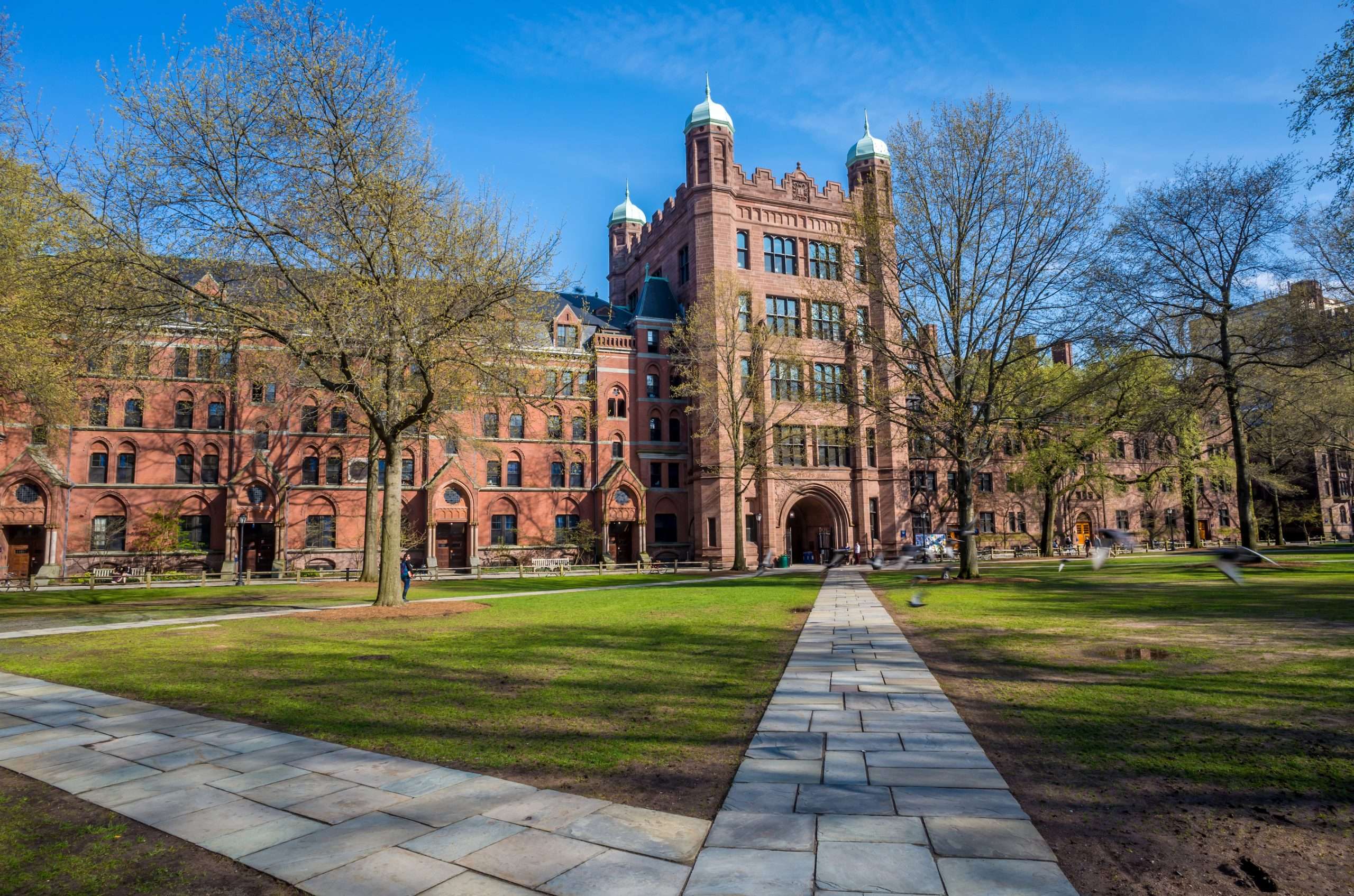
- Masters/PhD>Case Studies|Grad
Masters vs. PhD: Graduate Degree Options
July 01, 2021 :: Admissionado
Following the completion of your bachelor’s degree, you may be considering further education in your field to pursue your academic passions.
Or, perhaps you are at professional crossroads, and feel that pursuing a graduate degree may enable your pivot into a new industry, or enhance your career prospects in your current field.
With the exciting decision to study at the graduate level come infinite routes to achieving this goal. The beauty of a graduate program is that there is no “right” time, age or reason to go – graduate program classes are comprised of people with widely different academic and professional backgrounds, which further enhances a graduate education’s value to you. However, graduate school also comes with significant financial and time investment , so it is crucial to weigh your options carefully. Many graduate programs are competitive, and therefore you must honestly assess the strength of your profile and qualifications before deciding on which programs to apply.
There is a fair amount of information to process in graduate school admissions, and often, the nuances and differences between different graduate degree options can feel confusing and difficult to navigate. In this article, we will demystify the basic differences between a master’s and a PhD degree, cover the pros and cons of each, and help move you closer to determining which is the best fit for your goals.
What is the difference between a master’s degree and a PhD?
The next step in one’s educational journey following a bachelor’s degree is most commonly a master’s degree. There are more master’s degree programs than we can explore in this article, but below is a sample of the different range of degrees available:
Master’s Degree – A master’s degree is an advanced degree awarded following a bachelor’s degree. Much like a bachelor’s degree, the type of degree is determined by the subject matter, and can include:
- Master of Arts (MA) – e.g. English, History, Sociology,
- Master of Fine Arts (MFA) – e.g. Fiction, Drama, Music, Visual Arts
- Master of Science (MS) – e.g. Math, Computer Science, Physics, Chemistry, Biology
- Master of Education (MEd) – Teaching degree for elementary through secondary education
- Master of Business Administration (MBA) – Colloquially known as “business school,” (which we know a thing or two about)
We would be remiss to have an entire discussion about the different options for graduate degrees without discussing the two most commonly known (and commonly pursued) graduate degrees:
- Juris Doctor (JD) – A law degree, which is required to practice law in any U.S. state.
- Doctor of Medicine (MD) – A medical degree, which is required to practice medicine.
These degrees set themselves apart from the “master’s vs. PhD” discussion, as they are requisite degrees for very specific career tracks. Or, to put it another way, if you already know you want to be a medical doctor or a lawyer, you probably don’t need the info in this article.
A master’s degree can be a terminal degree, which is the furthest level of academic mastery that can be achieved for that subject. Some master’s degrees will prepare you to continue your studies and achieve your doctorate, otherwise known as a PhD program. At Admissionado, we want you to feel safe to ask the basic questions, so let’s start with the one everyone is often afraid to ask: What does PhD mean ?
Doctor of Philosophy (PhD) – The highest level of mastery achieved in most fields. (At least in the U.S. – in some countries, there are degrees known as Higher Doctorates, but a PhD is widely accepted as the ultimate terminal degree).
There are several factors that distinguish a PhD from a master’s degree:
- Original research – Compared to a master’s degree, in a PhD program you will make a unique contribution to your field of study on a particular topic that you propose to study when you apply to your program.
- Dissertation defense – This “unique contribution” is encapsulated with a dissertation that presents your thesis and findings. You must defend your thesis to a panel of professors in the field. Successfully defending your dissertation’s thesis is required to earn your PhD.
- Peer review – You have perhaps heard the phrase “publish or perish,” and this is in reference to the requirement to submit original academic articles to vigorous scrutiny in a peer-reviewed journal in order to substantiate your work throughout your doctoral program, and indeed, for the rest of your career if you remain in academia.
Why pursue a graduate degree?
Qualify for a particular career..
Many careers require you to complete graduate work to even be considered for the job. Jobs such as social work, post-secondary education, and scientific research will at minimum require a master’s degree.
Enhance your professional toolkit.
However, many master’s degrees, while not required to be considered for a position, will be considered an attractive enhancement to your profile and may help you distinguish yourself in a competitive pool of applicants. During a master’s program, you can gain sophisticated teaching and research experience, which are highly transferable job skills, as well as expose yourself to cutting-edge techniques and thought leadership in your field.
Networking opportunities.
Another benefit of pursuing a graduate degree are the networking opportunities it presents. Many graduate degree holders have said their master’s programs felt “like a three-year-long networking session.” This is a beneficial leg-up to creating industry connections for when you embark on your post-graduation job search.
How long does it take to get a graduate degree?
The short answer is: It depends .
A full-time master’s degree typically takes one to three years . However, it is important to consider if you will pursue your degree full-time or part-time. It will take longer to complete part-time, but you will be able to continue working full-time and retain income from full-time employment during the process of pursuing your master’s degree.
The length of a PhD program is a moving target that depends on the type of doctoral research you perform, as well as many other factors, such as the nature of your research (some fieldwork can take up to five years to complete). A safe range to give for completing a PhD program is four to nine years.
How expensive is each degree?
A master’s degree is a considerable financial investment, especially once you consider expenses for the cost of living if you are pursuing a degree full-time, which will be affected by the city in which you pursue your degree.
Cost of a master’s degree.
Let’s look at the annual tuition of three master’s degree programs, which will each result in vastly different career prospects:
- MBA from Harvard : Tuition – $72,000/year. Average starting salary of a Harvard MBA – $175,000
- MS in Computer Science from MIT : Tuition – $53,000/year. Average starting salary of an MIT-trained computer scientist – $85,000
- MFA, Iowa Writers’ Workshop at the University of Iowa : Tuition – $60,000/year. Average starting salary of MFA – $50,000
From a numbers perspective, an MS is certainly a good value for tuition compared to starting salaries. However, you must also factor in the cost of living – the median cost of living in Cambridge, MA is $3,000+/month, versus the median cost of living of $1,000/month in Iowa City.
Cost of a PhD program.
Compared to a master’s degree, most PhD degree programs are free(ish). Doctoral candidates will generally have their expenses paid through one (or a combination of) three ways:
- Fellowship – PhD research funded through a fellowship, government program or other entity, fellowships are highly sought after, as they will offer a PhD candidate the highest stipend to cover tuition and living expenses at no cost to the university’s department. Securing a fellowship is also a good boost to one’s CV.
- Research assistant stipend – As a research assistant, your income is based on conducting research for a university professor. These stipend-based funding mechanisms are most commonly found in STEM-based programs.
- Teaching assistant stipend – As a teaching assistant, your research will be funded according to the number of courses you teach at your university. While this is commonly the lowest-paying stipend, it does provide essential professional experience for PhD candidates who ultimately want to teach at the collegiate level.
When weighing your options between the cost of a master’s and a PhD, the main factors to consider are:
- Humanities vs. STEM – It’s an unfortunate reality, but Humanities departments are largely less well-funded than STEM departments at major universities, due to fewer commercial opportunities for Humanities research. Therefore, should you pursue a PhD in the humanities, it is most likely you will receive a teaching assistant stipend, which will mean less money for living expenses over the course of your program.
- Higher barrier to entry to obtain a PhD – Master’s degrees are strenuous, but a PhD is even more difficult, and you must overcome more obstacles, such as a qualifying exam after your first few years of the program, to continue. This means you must be committed to a high level of academic rigor and hard work for up to nine years before being able to call yourself “Doctor.” However, most programs will confer a master’s degree upon completion/passing of a qualifying exam, so if you do not complete your PhD program for whatever reason, you will still have obtained a degree from your hard work.
- Time – Pursuing a graduate degree full-time for one to three years, with the promise of a higher salary on the other side, is a far more accelerated timeline than four to nine years of graduate work (though expenses are generally paid for these programs).
Do your research. We hope that upon reading the many different considerations, you can appreciate more than ever that the answer to the “master’s vs. PhD” question will differ for each individual. There are an infinite variety of ways to pursue a graduate degree and to leverage it effectively for your career.
- Research different programs – Familiarize yourself with the programs at different schools, and the research interests of those programs’ professors.
- Set a budget – Ensure you can cover the cost of tuition AND living expenses while forgoing full-time employment.
- Network with as many people as possible – Talk to current students, alumni, professors and anyone who has direct experience in the graduate education world.
And then, finally… Apply!
*** NEW Admissionado Products & Services for MBA/Masters! ***Now, read up and get smart:
- Master in Finance Crash Course
- MBA Essay Analysis Book
- 50 Essays That Worked (Latest Edition)
- Resume Guide
- European Crash Course
That’ll get you started. Still have questions? Reach out, and let’s gab.
Our only requirement is that you don’t prefer warm milk over cold milk. Everyone else, 100% welcome.
Email: [email protected] Young People: WhatsApp , or Wechat (@JonFrankHBS) Older: Facebook , Twitter , LinkedIn Oldest: 866-409-4753
Related articles

get started.
Full Transparency
We might not be your best fit. If that’s the case, we will let you know.
You are using an outdated browser. Please upgrade your browser to improve your experience.

- Graduate Studies
You are in a modal window. Press the escape key to exit.
- News & Events
- See programs
Common Searches
- Why is it called Johns Hopkins?
- What majors and minors are offered?
- Where can I find information about graduate programs?
- How much is tuition?
- What financial aid packages are available?
- How do I apply?
- How do I get to campus?
- Where can I find job listings?
- Where can I log in to myJHU?
- Where can I log in to SIS?
- University Leadership
- History & Mission
- Diversity & Inclusion
- Notable Alumni
- Hopkins in the Community
- Hopkins Around the World
- News from Johns Hopkins
- Undergraduate Studies
- Online Studies
- Part-Time & Non-Degree Programs
- Summer Programs
- Academic Calendars
- Advanced International Studies
- Applied Physics Laboratory
- Arts & Sciences
- Engineering
- Peabody Conservatory
Public Health
- Undergraduate Admissions
- Graduate Admissions
- Plan a Visit
- Tuition & Costs
- Innovation & Incubation
- Bloomberg Distinguished Professors
- Undergraduate Research
- Our Campuses
- About Baltimore
- Housing & Dining
- Arts & Culture
- Health & Wellness
- Disability Services
- Calendar of Events
- Maps & Directions
- Contact the University
- Employment Opportunities
- Give to the University
- For Parents
- For News Media
- Office of the President
- Office of the Provost
- Gilman’s Inaugural Address
- Academic Support
- Study Abroad
- Nobel Prize winners
- Homewood Campus
- Emergency Contact Information
A Johns Hopkins postdoc, Herbert Baxter Adams, brought the seminar method of teaching from Germany, where he earned a PhD in 1876. The idea: That students would learn more by doing than by listening to lectures and taking exams.
That spirit of inquiry , of challenging the way things are done, lives on today in our nine academic divisions, all of which offer full-time graduate programs.
More information about our graduate programs is available below

School of Advanced International Studies
Students get global perspectives on today’s critical issues, with programs in international affairs , international studies , economics and finance , and public policy

Krieger School of Arts & Sciences
More than 60 full-time and part-time graduate programs spanning the arts , humanities , and natural and social sciences
Also see: Part-time graduate options via Advanced Academic Programs

Carey Business School
Offers a Global MBA and other masters programs, with an emphasis on health care management , real estate and infrastructure, financial businesses , and enterprise risk management

School of Education
One of the nation’s top schools of education, according to U.S. News & World Report , with degree and certificate programs in teaching , special education , counseling , administration , and leadership

Whiting School of Engineering
Programs in fields of critical importance to the future, health, and safety of our world, including robotics , biomedical engineering , cybersecurity , and systems engineering
Also see: Part-time and online options via Engineering for Professionals

School of Medicine
Since 1893, Johns Hopkins Medicine has trained the next generation of great medical leaders and is widely regarded as one of the best med schools and hospitals in the world, with top programs in internal medicine , women’s health , HIV/AIDS , geriatrics , drug/alcohol abuse , and pediatrics

School of Nursing
The U.S. News & World Report top-ranked school prepares graduate level pre-licensure students and current BSN or advanced practice nurses to be health care leaders through a variety of MSN, DNP, and PhD programs. Students can focus on a wide range of advanced practice specialty areas – including health care organizational leadership , nurse anesthesiology , pediatric , adult/Gerontological , family , or critical care .

Peabody Institute
Founded in 1857, this world-renowned conservatory offers degrees in composition , computer music , conducting , performance , jazz , music education , music theory , and recording arts and sciences

Bloomberg School of Public Health
The Bloomberg School, U.S. News & World Report ‘s top-ranked graduate school of public health for more than two decades, offers programs in health administration , health science , and public policy

- Johns Hopkins University
- Address Baltimore, Maryland
- Phone number 410-516-8000
- © 2024 Johns Hopkins University. All rights reserved.
- Schools & Divisions
- Admissions & Aid
- Research & Faculty
- Campus Life
- University Policies and Statements
- Privacy Statement
- Title IX Information and Resources
- Higher Education Act Disclosures
- Clery Disclosure
- Accessibility
All Graduate Programs
Are you interested in viewing all our graduate programs at once, including certificate and dual degree programs?
View PDF of All Graduate Programs
Addiction Policy & Practice
The Master’s of Science in Addiction Policy and Practice (ADPP) prepares students to work at the forefront of developing policy responses to the issue of addiction in the United States and abroad. Students follow an integrated, multidisciplinary curriculum that combines neuroscience, psychiatry, policy, and observational experiences in various policy and clinical settings. Students study the drivers of addiction, societal and environmental factors that lead to substance use disorders and other types of addiction, the science of prevention, treatment, and recovery from addiction, as well as the legal and policy aspects that form the nation’s addiction policies. Courses include domestic drug policy, health care financing, epidemiology, comparative approaches to drug and addiction policy, and data analysis.
Adult Gerontology Acute Care Nurse Practitioner
- Certificate
Through a hybrid blend of asynchronous didactic content, synchronous class sessions, and In-person on-campus intensives (OCIs), the Online Adult Gerontology Acute Care Nurse Practitioner (AG-ACNP) program from the School of Nursing & Health Studies prepares registered nurses (RNs) to manage the care of patients with acute and chronic conditions. Certificate option available for qualified students.
Advanced Biomedical Sciences (with George Mason University Joint Certificate)
- Graduate Certificate
The Advanced Biomedical Sciences (ABS) certificate program, in partnership with George Mason University, is offered through our GeorgeSquared Program. The program offers an outstanding biomedical sciences curriculum to enhance a student’s background for application to professional schools in the biomedical field.
Aging & Health
Our interdisciplinary program looks comprehensively at aging — a demographically inevitable process — and prepares students for emerging careers by shifting the conversation surrounding aging populations. Georgetown University’s Master’s in Aging & Health (AGHL) goes beyond geriatrics to encompass the study of aging well in today’s society.
Applied Economics
The M.A. in Applied Economics program has a key objective to provide students with a solid foundation in microeconomic and macroeconomic theory, as well as coursework that provides students with the ability to comprehend empirical analyses pertinent to the discussion of economic issues and equip them with the skills to undertake original research projects and data analysis. After completion of core courses, students study the application of these tools of economic study to a range of contemporary economic problems. This material is covered in a range of elective courses focusing on more specialized areas of economics.
Applied Mathematics
The Ph.D. program in Applied Mathematics prepares students for research and teaching careers in academia, industry, or government. The Department of Mathematics and Statistics has strong links to area employers and is already oriented toward providing graduate students with the skills most in demand in applied work.
Arab Studies
- Accelerated
The Center for Contemporary Arab Studies (CCAS) is the only academic center in the United States focusing exclusively on the Arab world. Through a master’s program or an undergraduate or graduate certificate, students will be trained in the language, history, culture, society, politics, and economics of the contemporary Arab world.
Arabic and Islamic Studies
The graduate program in Arabic and Islamic Studies aim to combine a thorough understanding of the Arabic language with scholarly research in the literary, linguistic and intellectual traditions of the Arab and Islamic world. The Arabic and Islamic Studies Department offers graduate level courses in Arabic linguistics, Islamic studies, and literature of the classical and modern eras. M.A. students will complete one Major concentration and one Minor concentration towards the degree. Similarly, Ph.D. students who are admitted with advanced standing will complete one Major concentration and one Minor concentration towards the degree. Those who are admitted to the Ph.D. program without an earned master’s degree in a related field will complete one Major concentration and two Minor concentrations.
Art & Museum Studies
Georgetown’s M.A. in Art & Museum Studies program is a selective program that combines the academic study of art history and museum practice and emphasizes the international contexts of museums in the modern world. Students work closely with Georgetown art history faculty, curators, and other museum professionals in Washington, D.C., and faculty specialists at Sotheby’s Institute of Art in London, England and New York City.
Asian Studies
The M.A. in Asian Studies Program gives students a unique combination of functional training and regional expertise, and provides students with the skills necessary to meet the demands of global private and public sector interests in Asia. Students have the opportunity to study core disciplines in the humanities and the social sciences as they relate to Asia, and are given the opportunity to specialize in at least one and potentially two areas of concentration.
Find Info For
- Alumni and Friends
- Engage with Purdue
- Research and Innovation
Quick Links
- Report a Concern
- Calendar of Events, Dates, and Deadlines
- Current Graduate Students
- Alumni and Giving
- Rankings and Recognition
- All Graduate Programs at Four Campuses
Graduate Degree Programs
- Certificate Programs
- Interdisciplinary Graduate Programs (OIGP)
- University Academic Catalog
- Course Information
- Publications
- Graduate Programs Office
- Office of Graduate Assistance (OGA)
- Guidelines for Graduate Student Mentoring and Advising
- Preparing for Graduate School
- Graduate Program Requirements
- Why Choose Purdue?
- Tuition & Fees
- How to Apply
- Check Application Status
- Transcript Upload Tips
- Admitted Students
- Visit Campus
- Global Ambassadors
- Purdue Graduate Student Center
- Request Information
- Fellowships
- Professional Development
- Information Management and Analysis
- Data Requests
- Database Project
Explore 160+ graduate programs on our West Lafayette campus, including top ranked master's, doctoral, and professional degrees — both residential and online options. Certificate, non-degree, and licensure* options are also available at the West Lafayette campus , along with nearly 80 programs on our three Regional Campuses .
Click on a program below to read its description and view statistics to help you make an informed choice. Don’t forget - you can apply for up to three different campuses and/or majors with a single application and fee payment!
All Graduate Programs at the Purdue West Lafayette campus
No results found.
Program Website Admission Requirements Program Contacts
Fall 2022: Out of applicants to the program, admitted. Total student enrollment: .
Fellowships - % / Research Assistantships - % / Teaching Assistantships - % / Other funding - %
Average time to complete the program: years.
Student to Faculty Ratio
Take your first step in .
Apply for up to three different campuses and/or majors with a single application and fee payment.
Funding and completion statistics above are based on a five year average when available. Newer programs may not have five years of data available. If no statistics are displayed, data are not yet available for the chosen program. For questions regarding data on this page or the Data Dashboard, contact Information Management and Analysis .
Communication
- OneCampus Portal
- Brightspace
- BoilerConnect
- Faculty and Staff
- Human Resources
- Colleges and Schools
- Find Workshops
- Funding Support
- Purdue Graduate Student Government
- Graduate School Directory
- Graduate School Toolkit
- Catalogs, Manuals, Policies
Ernest C. Young Hall, Room 170 | 155 S. Grant Street, West Lafayette, IN 47907-2114 | 765-494-2600
If you have trouble accessing this page because of a disability, please contact The Purdue University Graduate School .
- Skip to Content
- Catalog Home
- Institution Home
- Catalog Home >

The Graduate College Handbook outlines the general requirements for completion of a graduate degree or credential at ISU. Faculty in a major field have the responsibility for establishing educational objectives for their graduate program, including specific course requirements and research requirements appropriate to the doctoral, master's, and certificate programs in the major. These requirements may place additional responsibilities on the student, the major professor, or the student’s program of study (POS) committee beyond those listed in the Graduate College Handbook as deemed appropriate to the goals of the major program.
Faculty and graduate students are active participants in the academic programs of Iowa State University. As active participants, they have a collective impact on the success of those programs and of the university in fulfilling its mission. Each graduate program is encouraged to implement a mechanism for responding to feedback from graduate students as a valuable resource for continuing improvement.
Academic Program definitions
- Program - administrative infrastructure supporting the curriculum.
- Curriculum - the requirements for a major, certificate, or minor.
- Major - subject area of study that results in a named baccalaureate, master's, or doctoral degree upon completion of a set of requirements. A major appears on the academic transcript.
- Certificate - an academic credential in a focused area of study. A certificate appears on the academic transcript and may be earned concurrently with a degree or on its own.
- Minor - an academic area of emphasis that is in addition to a major. A minor appears on the academic transcript and must be earned in conjunction with a degree.
Ph.D. Programs
A complete list of Ph.D. Programs can also be found on https://www.grad-college.iastate.edu/academics/programs/apprograms.php.
Aerospace Engineering Agricultural and Biosystems Engineering Agricultural Economics Agricultural Education Agricultural Meteorology Analytical Chemistry Animal Breeding and Genetics Animal Physiology Animal Science Apparel, Merchandising, and Design Applied Linguistics and Technology Applied Mathematics Applied Physics Astrophysics Biochemistry Bioinformatics and Computational Biology Biomedical Sciences Biophysics Business and Technology Chemical Engineering Chemistry Civil Engineering Computer Engineering Computer Science Condensed Matter Physics Crop Production and Physiology Earth Science Ecology and Evolutionary Biology Economics Education Electrical Engineering Engineering Mechanics Entomology Environmental Science Fisheries Biology Food Science and Technology Forestry Genetics and Genomics Geology Gerontology High Energy Physics Horticulture Hospitality Management Human Computer Interaction Human Development and Family Studies Immunobiology Industrial and Agricultural Technology Industrial Engineering Inorganic Chemistry Kinesiology Materials Science and Engineering Mathematics Meat Science Mechanical Engineering Meteorology Microbiology Molecular, Cellular and Developmental Biology Neuroscience Nuclear Physics Nutritional Sciences Organic Chemistry Physical Chemistry Physics Plant Biology Plant Breeding Plant Pathology Population Sciences in Animal Health Psychology Rhetoric and Professional Communication Rural, Agricultural, Technological and Environmental History Rural Sociology Sociology Soil Science Statistics Sustainable Agriculture Toxicology Veterinary Microbiology Veterinary Pathology Wildlife Ecology Wind Energy Science, Engineering, and Policy
Master's Programs
A complete list of Graduate level programs is available at https://www.grad-college.iastate.edu/academics/programs/apprograms.php .
Accounting Aerospace Engineering Agricultural and Biosystems Engineering Agricultural Economics Agricultural Education Agricultural Meteorology Agronomy Analytical Chemistry Animal Breeding and Genetics Animal Physiology Animal Science Anthropology Apparel, Merchandising, and Design Applied Mathematics Applied Physics Architecture Artificial Intelligence Astrophysics Athletic Training Biochemistry Bioinformatics and Computational Biology Biomedical Sciences Biophysics Business Administration Business Analytics Chemical Engineering Chemistry Civil Engineering Community and Regional Planning Community Development Computer Engineering Computer Science Condensed Matter Physics Creative Writing and Environment Crop Production and Physiology Cyber Security Diet and Exercise Earth Science Ecology and Evolutionary Biology Economics Education Electrical Engineering Energy Systems Engineering Engineering Management Engineering Mechanics English Entomology Entrepreneurship Environmental Science Event Management Family and Consumer Sciences Finance Fisheries Biology Food Science and Technology Forestry Genetics and Genomics Geology Gerontology Graphic Design Healthcare Analytics and Operations High Energy Physics History Horticulture Hospitality Management Human Computer Interaction Human Development and Family Studies Immunobiology Industrial and Agricultural Technology Industrial Design Industrial Engineering Information Systems Inorganic Chemistry Integrated Visual Arts Interdisciplinary Graduate Studies Interior Design Journalism and Mass Communication Kinesiology Landscape Architecture Materials Science and Engineering Mathematics
Mathematics Education Meat Science Mechanical Engineering Meteorology Microbiology Molecular, Cellular and Developmental Biology Neuroscience Nuclear Physics Nutritional Sciences Operations Research Organic Chemistry Physical Chemistry Physics Plant Biology Plant Breeding Plant Pathology Political Science Professional Practice in Dietetics Psychology Real Estate Development Rhetoric, Composition, and Professional Communication Rural Sociology Science Education
Secondary Education Seed Technology and Business Sociology Soil Science Statistics Sustainable Agriculture Sustainable Environments Systems Engineering Teaching English as a Second Language/Applied Linguistics Toxicology Transportation Urban Design Veterinary Clinical Science Veterinary Microbiology Veterinary Pathology Veterinary Preventive Medicine Wildlife Ecology
Graduate Certificates
A complete list of Graduate level programs is available at https://www.grad-college.iastate.edu/academics/programs/apprograms.php
Advanced Manufacturing Agronomy Applied Research Methods in the Human Sciences Biochemistry Breeding for Organic Crops Business Analytics Community College Teaching Computational Fluid Dynamics (being discontinued) Computer Networking Construction Management Cyber Security Data Driven Food, Energy, and Water Decision Making Developmental and Family Sciences Advanced Research Design and Methods Digital Marketplace Analytics Early Childhood and Family Policy Education and Outreach in Agriculture and Natural Resources Education for Social Justice Embedded Systems Energy Systems Engineering Enterprise Cyber Security Management Entrepreneurship and Innovation Environmental Engineering Environmental Systems Family Financial Planning Family Well-Being in Diverse Society Finance Financial and Housing Counseling Food Safety and Defense Forensic Sciences Geographic Information Systems Gerontology Graduate Student Teaching Human Computer Interaction Infant and Early Childhood Mental Health Instructional Design Lifespan Development Literacy Coaching Certificate Mathematics Meat Science Nondestructive Evaluation Postsecondary Teaching Power Systems Engineering Preservation and Cultural Heritage Public Management and Policy Quantitative Psychology Seed Business Management Seed Science and Technology Software Systems Special Education Superintendent Licensure Supply Chain Management Systems Engineering Teaching English as a Second Language/Teaching English as a Foreign Language Veterinary Preventive Medicine Youth Development Specialist Youth Program Management and Evaluation
Graduate Minors
Minors are available in many disciplinary and interdepartmental graduate programs. Some programs offer only a minor. In other programs, students may declare either a major or a minor. Programs offering a major are not required to offer a minor. A student may not major and minor in the same discipline for a single degree or across multiple degrees. To illustrate, a student earning a Ph.D. in computer science may not minor in statistics for their Ph.D. program if they are also pursuing an MS in statistics.
Graduate Minor Only Programs
The following programs are available as minor only. These minors do not have an associated graduate major.
Applied Scientific Computing Criminal Justice Linguistics Philosophy Spanish Speech Communication Women's and Gender Studies

Online Students
For All Online Programs
On Campus, need or have Visa
Campus Students
For All Campus Programs
Is a Doctorate Degree Worth It?

Know before you read At SNHU, we want to make sure you have the information you need to make decisions about your education and your future—no matter where you choose to go to school. That's why our informational articles may reference careers for which we do not offer academic programs, along with salary data for those careers. Cited projections do not guarantee actual salary or job growth.
Earning a doctorate takes time, money and discipline. Like many things worth doing, the process is challenging but also rewarding. Becoming an expert in your subject area and immersing yourself in your chosen area of study makes the process of earning a doctorate important to many people. Certain professions require or value a doctorate for promotion potential.
In fact, career advancement, love of the subject matter and personal satisfaction are three of the top reasons why Dr. Bridgitte Kiprop '23 , Dr. Jennifer Barry ’23 and Dr. Torialyn Draper Crook earned their doctorates.
- For Kiprop '23, part of her motivation for earning a doctorate in International Business was setting an example for her six children.
- For Barry, ’23, who earned a doctor of education degree in educational leadership, part of her motivation was to prepare for success in meeting her long-term career goal to become a university president.
- And for Crook, earning her doctorate in education was a commitment that she undertook to honor her family’s legacy of valuing education.
How Difficult is Earning a Doctorate?
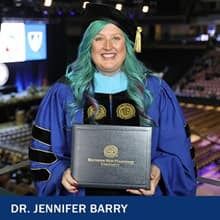
For Kiprop, time management was her key to success. With six children, she had to make the most of any time in the day that she could find. “If I had … five minutes, I would use the five minutes,” she said. “Other times, I was luckier (and had) two hours.”
Despite the time-management challenges of earning an advanced degree while raising her family, Kiprop feels that the process of earning that degree was a way to inspire her children to work hard to meet their own goals.
“I really hope that my children will ... know that whatever it is they feel called to do, whatever their ambitions, their goals are achievable,” she said.
To manage the challenge of advanced studies, having the right people around you as you work on your degree is essential, according to Crook. “Surround yourself with family, friends, colleagues and mentors who can provide encouragement during challenging times,” she said.
Crook stresses that everyone’s journey to earning their doctorate is unique. She recommends being prepared for the unexpected, and remaining flexible in adjusting your path as you work toward completing your degree.
How Long Does a Doctorate Take?
Students may have family commitments, health challenges or need to work full or part-time while attending school . Many students face all of these circumstances. Crook managed to complete her doctorate in 5 years, though it wasn't easy for her. She faced a significant personal health challenge and was raising two children while also attending school.
For Barry, earning her doctoral degree is part of an educational path that started with her bachelor’s degree at SNHU (formerly New Hampshire College) in 2000. She then continued her education to earn a master's degree throughout several jobs and geographic moves.
Barry views her entire educational journey as part of the process that led to meeting her ultimate goal of earning a doctorate.
What Skills Are Needed to Earn a Doctorate?

While every academic program is different, Crook finds certain skills and competencies necessary for success, regardless of field. These skills include:
- Building relationships
- Organizational skills
- Self-motivation
- Writing skills
Crook finds building relationships particularly important. While working on her degree, the strong relationship that she developed with her dissertation chairperson proved essential. She also built positive relationships with other doctoral students, which led to a strong peer support network throughout her program.
Kiprop echoes the importance of building relationships in her field as well. For her, building new relationships is a way to open your mind to new experiences and opportunities.
Find Your Program
What types of jobs can you get with a doctorate.
While a doctorate is helpful for working in leadership roles at colleges and universities, there are many opportunities for doctoral degree holders to work at the highest levels in their profession outside of higher education as well.
Some of the top professions that require a doctoral or professional degree and have a faster-than-average predicted growth rate, according to the BLS, are:
- Astronomers* (SNHU does not currently offer graduate degrees in astronomy or physics)
- Biochemists and biophysicists* (SNHU does not currently offer graduate degrees in biochemistry or biophysics)
- Clinical and counseling psychologists* (SNHU does not currently offer doctorates in psychology, but you could start with a bachelor's in psychology , followed by a master's in psychology )
- Higher education teachers and professors — particularly business, computer science and engineering teachers*
Two more examples of areas where a doctorate can help prepare you for advancement in your career are educational leadership and international business.
A doctorate in educational leadership can be a Doctor of Philosophy degree, known as a PhD, or a Doctor of Education degree, known as an EdD. The PhD in Education Leadership typically leads to higher education roles in teaching and research. The EdD in Educational Leadership , which Barry earned, typically leads to leadership and strategy roles in an education setting that may be at the higher education or secondary school level.

A PhD in International Business may include addressing a gap in an existing body of knowledge by conducting research. Kiprop, who earned her doctorate at SNHU, plans to use her degree to research entrepreneurship in small business finance.
Motivated by being from a developing country — Kenya — she has a personal interest in helping grow small businesses in similar developing areas. “I can also use that same knowledge at the New Hampshire level because the issues there perhaps are different but still … relevant,” she said.
Regardless of your program field, the process of earning a doctorate can help you explore ways of applying your newfound and existing knowledge that you may not have considered prior to starting your program.
Is it Better to Have a Master’s or Doctorate?
Both a master’s degree and a doctorate offer opportunities for career advancement. Choosing which to earn, or whether to earn both, is a highly personal decision based on your personal and professional goals and aspirations, according to Crook.
Before deciding which degree is right for you, consider your goals. Speaking with a career counselor or graduate admissions counselor to learn about career options and pathways toward earning the degree can be a helpful step toward making this decision.
In many fields, a master’s degree is enough to move forward in your career. But, earning a doctorate is an opportunity to take your career a step further, according to Crook. That step “gives one the opportunity to direct their career trajectory specifically through research and other specialized skills and knowledge,” she said.
How Valuable is a Doctorate?
A doctorate isn’t for everyone, but it can be right for you depending on your chosen field and career path.
For many people, earning a doctorate is just as important as a personal accomplishment as it is a professional one. “I (always) understood the significance of progressing in my career and staying connected to my field of higher education,” Crook said. “My doctoral journey was worthwhile as it aligned with my career goals and personal aspirations,” she said.
For Barry, the doctorate was worth it because she believes strongly in the power of education . “You see how (education) transforms people’s lives and … gives people opportunities that they didn’t see before,” she said.
She has seen many people earn degrees only for their family members to then continue in their footsteps. “I just think that generationally, (education) is creating pathways for people,” she said.
Deciding whether to pursue a doctorate is ultimately a very personal decision, but one that can lead you to build new relationships and a new knowledge base while helping you reach or exceed your career goals.
A degree can change your life. Find the SNHU doctorate degree that can best help you meet your goals.
*Cited job growth projections may not reflect local and/or short-term economic or job conditions and do not guarantee actual job growth. Actual salaries and/or earning potential may be the result of a combination of factors including, but not limited to: years of experience, industry of employment, geographic location, and worker skill.
A former higher education administrator, Dr. Marie Morganelli is a career educator and writer. She has taught and tutored composition, literature, and writing at all levels from middle school through graduate school. With two graduate degrees in English language and literature, her focus — whether teaching or writing — is in helping to raise the voices of others through the power of storytelling. Connect with her on LinkedIn .
Explore more content like this article

How to Survive High School and Prepare for College

How Long Does it Take to Get an Associate Degree?

How to Get a Master's Degree
About southern new hampshire university.

SNHU is a nonprofit, accredited university with a mission to make high-quality education more accessible and affordable for everyone.
Founded in 1932, and online since 1995, we’ve helped countless students reach their goals with flexible, career-focused programs . Our 300-acre campus in Manchester, NH is home to over 3,000 students, and we serve over 135,000 students online. Visit our about SNHU page to learn more about our mission, accreditations, leadership team, national recognitions and awards.

The Graduate School
University information technology (uit), main navigation.
- Events & Deadlines
- Degree Programs & Contacts
Building a Community of Scholars and Leaders
The Graduate School links you to resources that support success—from financial support and health & wellness resources, to themed workshops, travel funding, and much more.
students enrolled in graduate programs
graduate degrees offered by the U
million in research funding FY 2023
postdoctoral fellows and research associates
Graduate Admissions at the U Meet The Grad School
- Announcements
view all announcements

Stay Up To Date With All Things Graduate School
Follow us on Instagram to stay up-to-date on resources, events, scholarship opportunities and more all offered to U of U graduate students!

Spring Commencement
Get all of the information you need to have a successful commencement day!

Center For Teaching Excellence Offers Graduate Student Training
Check out the Graduate Student Training opportunities the Center for Teaching Excellence offers for Fall and Summer 2024!

Grammarly Premium is available to University of Utah Graduate Students!
Graduate students are encouraged to use Grammarly throughout their graduate research career and to assist with writing their manuscripts.
Resource Quick Links
Thesis & dissertation, degree requirements, responsible conduct of research, tuition benefit program, fellowships, scholarships & awards, travel assistance, mental wellness, health insurance, campus & community resources, professional development, graduate policies.
See all resources
Creating a Campus Climate that Welcomes All
We are committed to inclusiveness of students and professionals with diverse backgrounds and perspectives, to create a better academic environment for all.
Graduate School Diversity Office
International Student Info
We recognize and honor that the university is located on the traditional and ancestral homelands of the Shoshone, Paiute, Goshute and Ute tribes. Read the full Indigenous Land Acknowledgement .
FOR POSTDOCS
FOR FACULTY & STAFF
FOR Directors of Graduate Studies
Events & Deadlines
View All Events
Thursday 11am - 1pm
Coffee & Kolaches
Park Building - John R. (PARK)
Friday
Spring 2024 Full-Term Last Day to Reverse CR/NC Option
Spring 2024 second half last day to reverse cr/nc option.
Tuesday
Spring 2024 Full-Term Classes End
Spring 2024 second half classes end.
Tuesday 12pm - 1pm
[UPDA] Academic Path Spring Roundtable - Insights Into the Tenure-track Faculty Search
Health Sciences Education Building - Spencer F. and Cleone P. Eccles (HSEB)
Connect with Us
Icon instagram, icon linkedin.
Connect with your colleagues and strengthen your professional network.
Follow us on LinkedIn
Support the Grad School
When you give to the Grad School you assist us in our mission to serve students, postdoctoral fellows, staff and faculty by
icon offering financial assistance icon supporting innovative academic opportunities icon providing professional development
Give to the Grad School
- About the Hub
- Faculty Experts Guide
- Subscribe to the newsletter
Explore by Topic
- Arts+Culture
- Politics+Society
- Science+Technology
- University News
- Voices+Opinion
- About Hub at Work
- Gazette Archive
- Benefits+Perks
- Health+Well-Being
- Current Issue
- About the Magazine
- Past Issues
- Support Johns Hopkins Magazine
- Subscribe to the Magazine

Credit: Will Kirk / Johns Hopkins University
Johns Hopkins graduate programs again ranked among nation's best
'u.s. news & world report' includes 38 jhu programs among the top 10 in the u.s. in its annual rankings, including no. 1 ranked programs in nursing and public health.
By Hub staff report
Johns Hopkins University has 38 graduate schools, academic programs, and specialties ranked among the top 10 in the nation, including nine with No. 1 rankings, according to the latest edition of "Best Graduate Schools" from U.S. News & World Report , published earlier today.
Two schools at Hopkins—the Bloomberg School of Public Health and the School of Nursing —earned No. 1 rankings overall, and the School of Education entered the top 10, according to U.S. News & World Report .
Portions of the publication's annual list were released today but rankings for schools of medicine and engineering were delayed and will be released at a later date.
Among the new rankings released today:
The School of Nursing's DNP program ranked No. 1 for the third year in a row. Its master's degree programs tied at No. 1, up from No. 2 last year. In gerontology, the school moved up two spots to No. 1 for primary care, and up one spot to No. 2 for acute care. In other specialty areas, the School of Nursing's doctoral programs ranked:
- Psychiatric/mental health: No. 1
- Family: No. 3 (tied)
- Leadership: No. 4 (tied)
- Nursing Anesthesia: No. 36 (tie)
The Bloomberg School retained its longtime No. 1 overall ranking among public health programs—it has held the top spot since 1994, the year the rankings began. In specialty areas, the Bloomberg School ranked:
- Environmental Health Sciences: No. 1
- Epidemiology: No. 1
- Health Policy and Management (Public Health): No. 1
- Social and Behavioral Sciences: No. 1
- Biostatistics: No. 2
Johns Hopkins tied at No. 8 in the Education category, up from No. 13 last year. The school also tied at No. 23 in higher education administration programs.
Public Affairs
Overall, Johns Hopkins programs in public affairs tied at No. 39. In subcategories, Johns Hopkins tied at No. 6 in Health Policy and Management (Public Affairs), No. 11 in International/Global Policy and Administration, and tied at No. 35 in Public Policy Analysis.
U.S. News & World Report updates some of its rankings each year and republishes the most recent rankings in other areas. Among the republished rankings for Hopkins, which are still current:
Biological Sciences
Hopkins is tied for No. 6 overall with six top 10 specialty rankings:
- Molecular biology: No. 3 (tie)
- Cell biology: No. 4
- Neuroscience: No. 4 (tie)
- Immunology: No. 5
- Genetics, genomics, and bioinformatics: No. 6 (tie)
- Biochemistry, biophysics, and structural biology: No. 8
Biostatistics
Hopkins is ranked No. 1 (tie) for Biostatistics at the doctoral level. (Note: U.S. News & World Report also ranks biostatistics as a sub-category of public health, where Hopkins is No. 2.)
The university is tied at No. 20 in Chemistry and ranks No. 9 in the Biochemistry subcategory.
The university is tied for No. 24 overall and tied at No. 21 in the specialty of Artificial Intelligence.
Earth Sciences
The university is tied at No. 30 in Earth Sciences.
Johns Hopkins' program in economics is tied at No. 22.
English tied at No. 13 overall with the following specialty rankings:
- Literary criticism and theory: No. 3
- British literature: No. 10 (tie)
- American literature after 1865: No. 17
Health Care Management
The university is No. 7.
Johns Hopkins ranks No. 10 overall, with the following specialty rankings:
- African-American history: No. 3 (tie)
- Cultural history: No. 4 (tie)
- U.S. Colonial history: No. 5 (tie)
- Women's history: No. 6 (tie)
- African history: No. 7 (tie)
- European history: No. 7 (tie)
- Modern U.S. history: No. 16 (tie)
Mathematics
Johns Hopkins is tied at No. 20 in Mathematics with the following specialty rankings: + Analysis: No. 18 (tie) + Algebra: No. 23 (tie) + Applied Math: No. 25
Overall, the university is tied at No. 13 with the following specialty rankings: + Living Systems: No. 5 (tie) + Cosmology: No. 7 + Condensed Matter: No. 13 (tie)
Political science
Overall, political science is tied at No. 41. In sub-categories, Johns Hopkins ranked: + Political theory: No. 8 (tie) + International politics: No. 24 (tie)
The university's graduate program in psychology is tied at No. 12 overall and tied at No. 5 in the subcategory of behavioral neuroscience.
Overall, sociology is tied at No. 29. The sub-category of sociology of population is tied at No. 17.
Posted in University News
Tagged u.s. news and world report , university rankings
Related Content

Engineering online programs again ranked among nation's best

Hopkins No. 9 in 'U.S. News' rankings
You might also like, news network.
- Johns Hopkins Magazine
- Get Email Updates
- Submit an Announcement
- Submit an Event
Discover JHU
- About the University
- Academic Programs
- my.JohnsHopkins.edu
- © 2024 Johns Hopkins University . All rights reserved.
- University Communications
- 3910 Keswick Rd., Suite N2600, Baltimore, MD
- X Facebook LinkedIn YouTube Instagram
- Academics >
- Graduate Programs >
- PhD in Urban and Regional Planning >
PhD Candidates and Alumni
- UB Directory
Current PhD Candidates

[email protected]
Education: BEng: Urban Planning, Tianjin University, China; DEP: Diplôme d'État de Paysagiste, ENSAP Bordeaux, France; MRes: Spatial Data Science and Visualization, CASA UCL, U.K.

Education: MP, Master in Planning, Graduate School of Planning (May 2020); BS, Bachelor of Science in Biology (May 2014)
Education: MSc, Urban Development and Planning, University College London (UCL); BSc (Hons.) Land Economy, Kwame Nkrumah University of Science and Technology (KNUST)
Education: Bachelor’s of Science from Cornell University, College of Agriculture and Life Sciences, Development Sociology. Graduated in 2015. ;Master’s in Urban and Regional Planning from University at Buffalo, College of Architecture and Planning. Graduated in 2021.

Education: MS Environmental Science - Concentration in Environmental and Community Land Planning, State University of New York College of Environmental Science and Forestry; BA Latin American Studies, University of Chicago
Education: MS, Urban Placemaking and Management, Pratt Institute; BA, Environmental Design, University at Buffalo
Education: MPS, Environmental Science, State University of New York College of Environmental Science and Forestry; CAS, The Maxwell School of Syracuse University; BA, Architecture, Petra Christian University

Education: M.P.A - Master of Public Administration. Institution: California State University San Bernardino, California. Year : 2005; B.Sc. - City and Regional Planning. Institution: University of Engineering and Technology, Lahore , Pakistan Year: 1999

The two most common types of graduate degrees are master's and doctoral degrees: A master's is a 1-2 year degree that can prepare you for a multitude of careers. A PhD, or doctoral degree, takes 3-7 years to complete (depending on the country) and prepares you for a career in academic research. A master's is also the necessary first ...
Ph.D.'s take a considerably longer time to complete than a master's, five to eight years on average, and they carry a rather high rate of noncompletion due to time and financial commitments. Many Ph.D. programs have stipends available, so it's important to inquire about that when researching a particular program.
It's still worth noting that students have the option of completing a master's degree first and then, based on their experiences and career aspirations, deciding whether to pursue a PhD. Find the right graduate degree at SMU . A graduate degree is a big investment, so investing in the right program is important.
Ph.D. study includes a major research project in addition to coursework, and a Ph.D. is the highest scholastic degree awarded by American universities. Contrary to common perception, career paths for Ph.D. graduates are quite varied, not just limited to academia. Ph.D. training helps you hones skills such as writing, research, teaching, data ...
A Master's degree is a second-cycle academic degree and the first level of graduate study, which means it is after a Bachelor's degree and before a PhD. The Master's degree may allow a concentration within a field so that you may focus your studies in-depth on a particular aspect of a subject.
The most obvious difference between a Masters and a PhD in terms of overarching course structure is length. Whereas a Masters is completed in 1-2 years, a PhD will usually take 3-4 years (if studied full-time) or 5-6 years (if studied part-time). 3-4 years may sound like a long time, but by the end of a PhD you'll not only researched, written ...
Earning any type of degree, either a master's degree or a doctorate, can increase your average annual salary. According to the Bureau of Labor Statistics , people with a master's degree earn an average weekly salary of $1,497. Those with a Ph.D. earn an average weekly salary of $1,883. Both degrees can also help students develop highly ...
Most of the degrees featured at Idealist Grad Fairs are professional master's degrees supporting careers in the social good sector. Terminal Master's degrees are the highest academic degree in their field. While some master's degrees may serve as the first step towards a doctorate, others—such as a Master's of Fine Arts in Creative ...
2. PhD: After earning a master's degree, the next step is a PhD, which entails both working and performing research at an institution. A PhD is an abbreviation for "Doctor of Philosophy.". It is the highest academic degree one can achieve. As such, it is a time-consuming pursuit that requires a lot of studying and research.
A Masters degree is the next level of education after the completion of an undergraduate degree, commonly known as a Bachelors. These degree levels are often referred to in terms of cycles so that a Bachelor's is a first-cycle degree, a Masters is a second-cycle and finally, a PhD is the third-cycle of higher education (and the highest).
A graduate degree requires a significant investment of time. Master's degrees require less time than doctoral degrees. Typically a full-time student can acquire a master's degree in about two years. A PhD usually requires at least five to six years and many people take seven to nine years. Money
Degrees Offered. Doctor of Philosophy (PhD) Deadline. Dec 01, 2023 | 05:00 pm. Next. The Harvard Kenneth C. Griffin Graduate School of Arts and Sciences is a leading institution of graduate study, offering PhD and select master's degrees as well as opportunities to study without pursuing a degree as a visiting student.
A master's degree is a type of graduate degree. In most fields, it is not a terminal degree—meaning that it is not the highest degree you can earn. The one notable exception is in the fine arts, where the master's is a terminal degree—there is no "Doctor of Fine Arts.". Master's degree programs typically take around two years to ...
On paper, Master's programs tend to be cheaper than PhD programs. This difference is not surprising considering the shorter duration required to complete a Master's degree. However, there is usually more funding and financial aid available for PhD students in the form of fellowships, teaching assistantships, or grants.
Degree Length. Another significant difference between a master's degree and a Ph.D. program is the length of time they take to complete. Master's programs are much shorter and will typically take two years to complete. Some universities even offer accelerated programs that allow you to complete your master's degree within a single year.
Cost of a master's degree. Let's look at the annual tuition of three master's degree programs, which will each result in vastly different career prospects: MBA from Harvard: Tuition - $72,000/year. Average starting salary of a Harvard MBA - $175,000. MS in Computer Science from MIT: Tuition - $53,000/year.
Masters vs a PhD. There are two types of degree paths a student may take in graduate school. A master's degree is typically a career-focused degree program. It aims to help students develop skills in a specific area based on what they wish to study. A PhD degree, also known as a doctorate degree, is different. It is typically a research heavy ...
The U.S. News & World Report top-ranked school prepares graduate level pre-licensure students and current BSN or advanced practice nurses to be health care leaders through a variety of MSN, DNP, and PhD programs. Students can focus on a wide range of advanced practice specialty areas - including health care organizational leadership, nurse anesthesiology, pediatric, adult/Gerontological ...
Graduate School of Arts & Sciences. The Master's of Science in Addiction Policy and Practice (ADPP) prepares students to work at the forefront of developing policy responses to the issue of addiction in the United States and abroad. Students follow an integrated, multidisciplinary curriculum that combines neuroscience, psychiatry, policy, and ...
Graduate Degree Programs. Explore 160+ graduate programs on our West Lafayette campus, including top ranked master's, doctoral, and professional degrees — both residential and online options. Certificate, non-degree, and licensure* options are also available at the West Lafayette campus, along with nearly 80 programs on our three Regional ...
The Graduate College Handbook outlines the general requirements for completion of a graduate degree or credential at ISU. Faculty in a major field have the responsibility for establishing educational objectives for their graduate program, including specific course requirements and research requirements appropriate to the doctoral, master's, and certificate programs in the major.
Both a master's degree and a doctorate offer opportunities for career advancement. Choosing which to earn, or whether to earn both, is a highly personal decision based on your personal and professional goals and aspirations, according to Crook. ... SNHU is a nonprofit, accredited university with a mission to make high-quality education more ...
We are committed to inclusiveness of students and professionals with diverse backgrounds and perspectives, to create a better academic environment for all. Graduate School Diversity Office. International Student Info. Code of Conduct. Free Speech. We recognize and honor that the university is located on the traditional and ancestral homelands ...
Graduate Programs. Explore the many professional programs offered below. Use the search box for a direct query or browse by degree, area, and specific campus location. Simply click on each program's title for more details. Find your program by choosing from any of the options below.
Johns Hopkins University has 38 graduate schools, academic programs, and specialties ranked among the top 10 in the nation, including nine with No. 1 rankings, according to the latest edition of "Best Graduate Schools" from U.S. News & World Report, published earlier today.. Two schools at Hopkins—the Bloomberg School of Public Health and the School of Nursing—earned No. 1 rankings overall ...
The nursing master's program came in at No. 4 (up 17 spots) for public universities and No. 10 (up 28) nationally. The master of public health program also jumped ahead 23 spots to become No. 53 nationally among all institutions, and 35th among publics.
Program Director: Shiv Pillai, M.D., Ph.D., Professor of MedicineShiv Pillai is a Professor of Medicine and Health Sciences and Technology at Harvard Medical School. He is the director of the Harvard PhD and MMSc Immunology programs and of the HMS-HST MD student research program. He is also the program director of an NIH-funded Autoimmune Center of Excellence at Massachusetts General Hospital ...
Discover the 10 best U.S. colleges offering online management Ph.D. programs, and explore tips and considerations for going to graduate school online.
Master of Arts (Non-Thesis Option) - for PhD students only. Applicants new to Texas A&M may not apply to this program. This degree is only available to current Texas A&M graduate students who are seeking an MA before continuing through the PhD program. Archaeology, Biological, Cultural Programs - Core Courses. ANTH 601 - Biological ...
Education: Bachelor's of Science from Cornell University, College of Agriculture and Life Sciences, Development Sociology. Graduated in 2015. ;Master's in Urban and Regional Planning from University at Buffalo, College of Architecture and Planning. Graduated in 2021.
- Bahasa Indonesia
- Slovenščina
- Science & Tech
- Russian Kitchen
Cruising the Moskva River: A short guide to boat trips in Russia’s capital

There’s hardly a better way to absorb Moscow’s atmosphere than on a ship sailing up and down the Moskva River. While complicated ticketing, loud music and chilling winds might dampen the anticipated fun, this checklist will help you to enjoy the scenic views and not fall into common tourist traps.
How to find the right boat?
There are plenty of boats and selecting the right one might be challenging. The size of the boat should be your main criteria.
Plenty of small boats cruise the Moskva River, and the most vivid one is this yellow Lay’s-branded boat. Everyone who has ever visited Moscow probably has seen it.

This option might leave a passenger disembarking partially deaf as the merciless Russian pop music blasts onboard. A free spirit, however, will find partying on such a vessel to be an unforgettable and authentic experience that’s almost a metaphor for life in modern Russia: too loud, and sometimes too welcoming. Tickets start at $13 (800 rubles) per person.
Bigger boats offer smoother sailing and tend to attract foreign visitors because of their distinct Soviet aura. Indeed, many of the older vessels must have seen better days. They are still afloat, however, and getting aboard is a unique ‘cultural’ experience. Sometimes the crew might offer lunch or dinner to passengers, but this option must be purchased with the ticket. Here is one such option offering dinner for $24 (1,490 rubles).

If you want to travel in style, consider Flotilla Radisson. These large, modern vessels are quite posh, with a cozy restaurant and an attentive crew at your service. Even though the selection of wines and food is modest, these vessels are still much better than other boats.
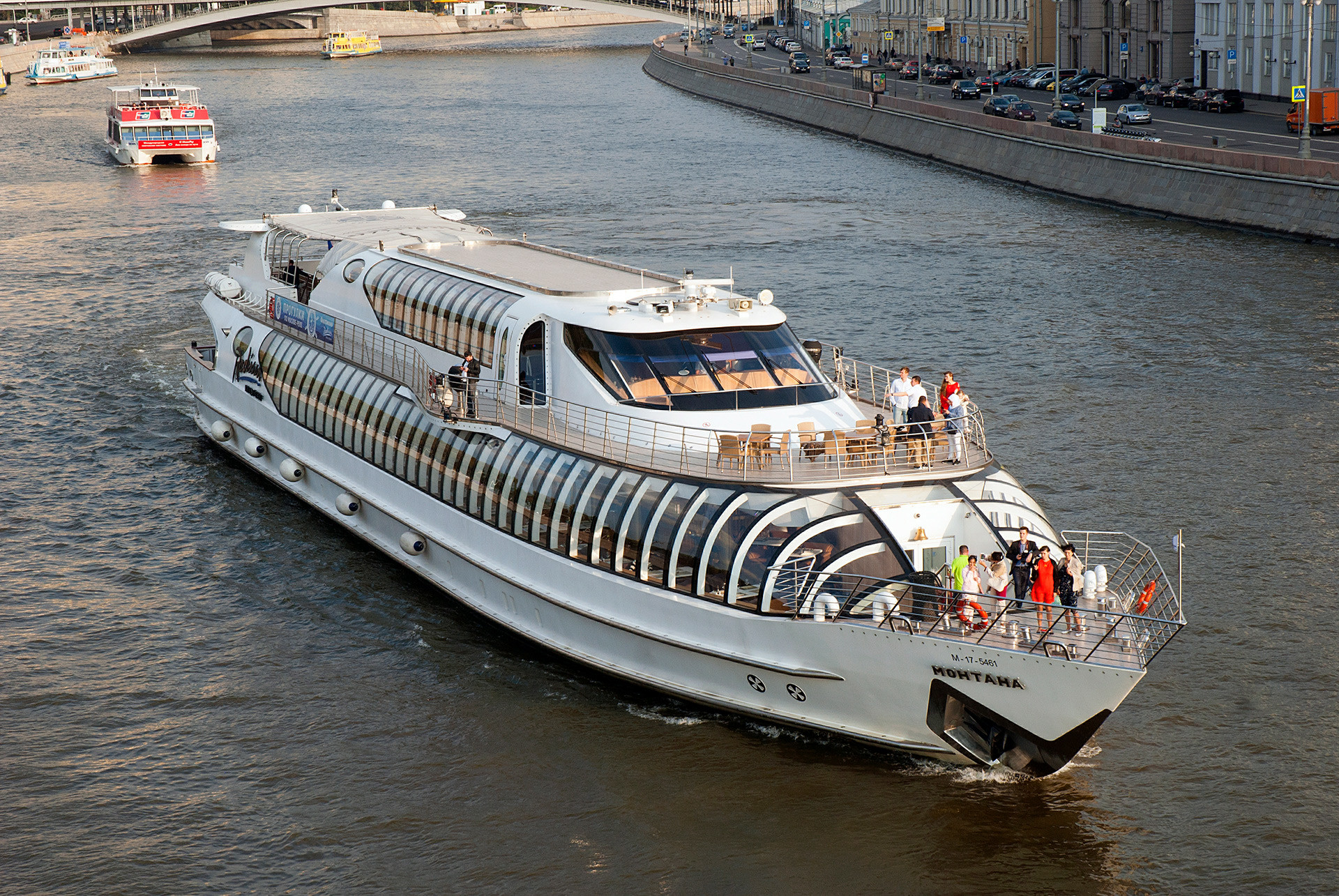
Surprisingly, the luxurious boats are priced rather modestly, and a single ticket goes for $17-$32 (1,100-2,000 rubles); also expect a reasonable restaurant bill on top.
How to buy tickets?
Women holding photos of ships promise huge discounts to “the young and beautiful,” and give personal invitations for river tours. They sound and look nice, but there’s a small catch: their ticket prices are usually more than those purchased online.
“We bought tickets from street hawkers for 900 rubles each, only to later discover that the other passengers bought their tickets twice as cheap!” wrote (in Russian) a disappointed Rostislav on a travel company website.
Nevertheless, buying from street hawkers has one considerable advantage: they personally escort you to the vessel so that you don’t waste time looking for the boat on your own.

Prices start at $13 (800 rubles) for one ride, and for an additional $6.5 (400 rubles) you can purchase an unlimited number of tours on the same boat on any given day.
Flotilla Radisson has official ticket offices at Gorky Park and Hotel Ukraine, but they’re often sold out.
Buying online is an option that might save some cash. Websites such as this offer considerable discounts for tickets sold online. On a busy Friday night an online purchase might be the only chance to get a ticket on a Flotilla Radisson boat.
This website (in Russian) offers multiple options for short river cruises in and around the city center, including offbeat options such as ‘disco cruises’ and ‘children cruises.’ This other website sells tickets online, but doesn’t have an English version. The interface is intuitive, however.
Buying tickets online has its bad points, however. The most common is confusing which pier you should go to and missing your river tour.
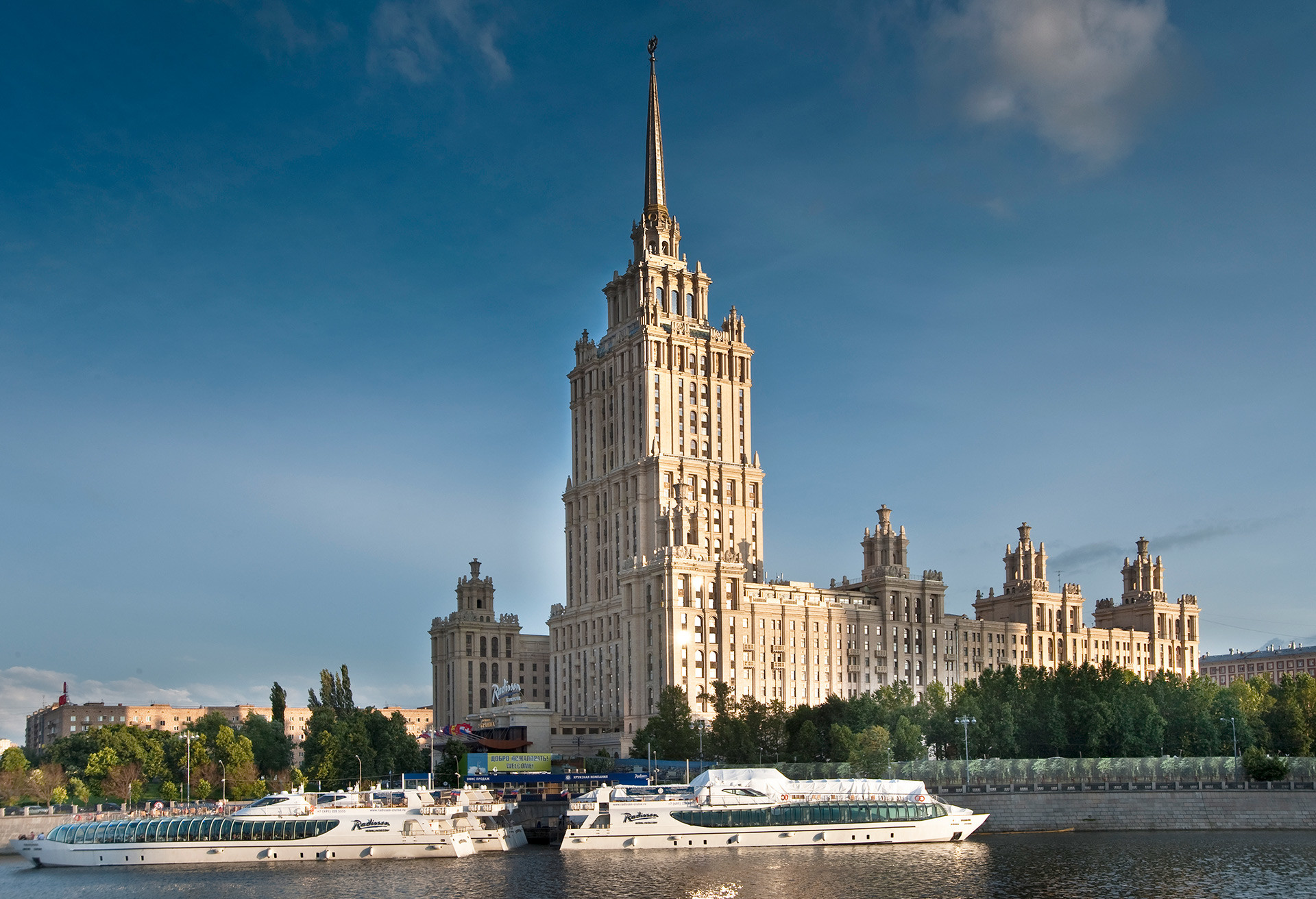
“I once bought tickets online to save with the discount that the website offered,” said Igor Shvarkin from Moscow. “The pier was initially marked as ‘Park Kultury,’ but when I arrived it wasn’t easy to find my boat because there were too many there. My guests had to walk a considerable distance before I finally found the vessel that accepted my tickets purchased online,” said the man.
There are two main boarding piers in the city center: Hotel Ukraine and Park Kultury . Always take note of your particular berth when buying tickets online.
Where to sit onboard?
Even on a warm day, the headwind might be chilly for passengers on deck. Make sure you have warm clothes, or that the crew has blankets ready upon request.
The glass-encased hold makes the tour much more comfortable, but not at the expense of having an enjoyable experience.

Getting off the boat requires preparation as well. Ideally, you should be able to disembark on any pier along the way. In reality, passengers never know where the boat’s captain will make the next stop. Street hawkers often tell passengers in advance where they’ll be able to disembark. If you buy tickets online then you’ll have to research it yourself.
There’s a chance that the captain won’t make any stops at all and will take you back to where the tour began, which is the case with Flotilla Radisson. The safest option is to automatically expect that you’ll return to the pier where you started.
If using any of Russia Beyond's content, partly or in full, always provide an active hyperlink to the original material.
to our newsletter!
Get the week's best stories straight to your inbox
- What to do in Moscow City, if you’re not mega-rich
- Moscow after dusk: 10 places to drink, dance, and groove
- 5 things you must do in Moscow in 2018 between football matches (or without them)
- Sandwiched between Moscow and St. Petersburg: How to spend a perfect weekend in Tver
- 24 or 48 hours in Moscow: Where to go and what to do in 2019
This website uses cookies. Click here to find out more.
- Guided tour
River Cruise on Luxurious Radisson Boat
- Description
- Choose date

Equipped with ice-breaking technology, these huge fancy yachts are the only river cruisers running all year around. The round trip journey takes two and a half hours and floats past all the big sights like the White House, Novodevichy monastery and the Kremlin. There’s a large open air observation deck up top, while the main body of the ship houses a restaurant with a dance floor for a romantic post dinner dance. For a particularly romantic experience take one of the evening boats and admire the bright lights of the city skyline at night.
The most relaxing and picturesque tour that Moscow can offer: a great way to see the city center and its main attractions. This is a perfect alternative to exploring the city by car, if you only have time to do sightseeing during weekday rush hours.
Your English-speaking guide is eager to share every bit of their knowledge about the surrounding landscape, the architecture and historical details.
We conduct Moscow river tour on Radisson Flotilla boats all year around! It’s warm inside during winter months, while there’s air conditioning during hot summer days. You may also treat yourself to drinks, lunch or dinner on board (drinks and food are not included in tour price).
The cost of an excursion with a personal guide for 1 person
Quay at Radisson Collection Hotel
Government Headquarters ("the White House")
Kievsky Railway Central
Novodevichy Convent
Luzhniki Stadium
Academy of Sciences
Monument to Peter I
Cathedral of Christ the Saviour
Moscow Kremlin
St.Basil's Cathedral
Novospassky Monastery
U-turn and back to Quay at Radisson Royal Hotel
Choose your dates
Who's going.
- Excursion River Cruise on Luxurious Radisson Boat
- Date and time:
- Who's going:
See photo of the meeting point

COMMENTS
Money-saving time for April with Dublin Bay Cruises Promo Codes. Ticket Prices - Save Up to 20% the promotion started in April. With Ticket Prices - Save Up to 20%, you can reduce your payables by around $23.72. Coupons don't last forever, so act before they expire.
There are three Dublin Bay Cruise offices - one in the city centre at Sir John Rogerson's Quay (near The Ferryman). There's another in Howth (opposite Aqua restaurant). And there's a third in Dun Laoghaire (on the East Pier). 2. Several different routes to try. Dublin Bay Cruises are billed as a way to enjoy Dublin from a truly unique ...
The Merchant. Dublin Bay Cruises is a sister company of Cliffs of Moher Cruises and Doolin 2 Aran Ferries, who have 15 years' experience operating cruise ships on the west coast. Dublin Bay Cruises visits the sight and sounds that the bay has to offer from the 26-metre long steeled hull vessel, which goes by the name of the St Bridget.
Dublin Bay Cruises takes pride in being the foremost provider of captivating boat trips and cruises along the UNESCO Biosphere of Dublin's River Liffey and the expansive Dublin Bay. Founded by the Garrihy family in 2013, our immersive journeys are crafted to provide passengers with not only breathtaking scenic views but also an engaging ...
Dublin Bay Cruises coupons - save massive EXTRA from Dublin Bay Cruises sales or markdowns this week for a limited time. Expired 02/19/2024 100 . Get Deal. Expired 02/19/2024 100 . Get Deal > 10% Off. 10% Off on Bargain Items. Get the free Dublin Bay Cruises coupon code and apply it when you purchase online. Great Coupons don't come along everyday.
The best promo available as of yesterday is 10% off from "Dublin Bay Cruises Coupon: 10% Off Your Next Purchase". Dublin Bay Cruises Free Shipping Promos. Retailers use free shipping promos as a means of stimulating sales. These promos generally provide complimentary delivery when the given code is input at the point of sale.
60-70 minutes. Explore beyond Dublin city center on this cruise across Dublin Bay. As you sail from Dublin, spot several landmarks like…. Free cancellation. from. ₹2,312. per adult. Reserve. 1 Hour Boat Trip from Howth to Dun Laoghaire.
Dublin Bay Cruises, Dún Laoghaire, Dublin, Ireland. 24,184 likes · 230 talking about this · 2,633 were here. DUBLIN BAY CRUISES Take an idyllic cruise on the capital's beautiful Dublin Bay and see...
Dublin Bay Cruises is a sister company of Cliffs of Moher Cruises and Doolin 2 Aran Ferries, who have 15 years' experience operating cruise ships on the west coast. Dublin Bay Cruises visits the sight and sounds that the bay has to offer from the 26-metre long steeled hull vessel, which goes by the name of the St Bridget.
A DART train voucher is included with your Dublin Bay Cruise booking confirmation, which entitles each passenger to travel between any station on the Dun Laoghaire/Howth/Dun Laoghaire DART route on the same day of sailing for a discounted price. Your vessel for the voyage is the St Bridget -- a 26-metre steel-hulled ship with a highly-trained crew.
Promo code, discount, coupon for Dublin Bay Cruises. Dun Laoghaire to Dublin City or Dalkey Island, Howth to Ireland's Eye/Howth Cliffs, etc.
First order at Dublin Bay Cruises gets you $25 Off. Use only one coupon at a time.
Join Dublin Bay Cruises as you travel along Dublin's beautiful coastline and head to Dún Laoghaire on this relaxing hour long cruise. City to Dun Laoghaire. Dublin City to Howth . Escape the city and enjoy a cruise from Dublin City Centre to the beautiful village of Howth as you travel via Dun Laoghaire. You will see many beautiful things that ...
Use Dublin Bay Cruises Coupon to save 20% instantly. Shops Deals Categories 20% OFF Dublin Bay Cruises Discount Code & Promo Code | April 2024 For FREE. Verified Apply all Dublin Bay Cruises codes at checkout with one click. Trusted by 5,000,000+ members. Verified ...
Dublin Bay Cruises - Plan Your Trip. Get a close-up view of some of Dublin Bay's famous islands, towers, and wildlife! Experience one of Dublin Bay's first tours! Make a super day out and begin at Howth, Dublin City, or Dun Laoghaire. See Ireland's Eye, Dalkey Island, Poolbeg Chimneys, Dún Laoghaire Harbour, Martello Towers and Baily ...
Enjoy a 33% off price cut basically thanks to 11 active sales.Look towards the bottom of the page for Dublin Bay Cruises Voucher Code's FAQs. For more information, go to dublinbaycruises.com. Rated 4.1 - 6 votes. dublinbaycruises.com 11 Vouchers Updated on October 01, 2023.
Dublin City to Dun LaoghaireEscape the hustle and bustle of Dublin City and sail on a majestic 60-70 minute cruise south of Dublin Bay to the beautiful Dun Laoghaire Harbour. During your voyage … read more. Location Dublin Bay Cruises - Sir John Rogerson's Quay, Grand Canal Dock, Dublin, Ireland. Starting from €25.00.
Dún Laoghaire to Dublin City. €25 per person. Departing from the charming Dun Laoghaire Harbour, the cruise takes passengers on a journey that unfolds the beauty of Dublin Bay and its surroundings. Explore Trip. 60 Minutes.
Dublin Bay Cruises: 7 Boat Tours Worth Trying (Dalkey Island, Lambay + More) By Author Emma Baird. Posted on Last updated: December 31, 2023. If you're in search of unique thing
Prices start at $13 (800 rubles) for one ride, and for an additional $6.5 (400 rubles) you can purchase an unlimited number of tours on the same boat on any given day.
Book. Guided tour. 2,5 hours. Популярные , Речные прогулки. Code: 10147. Equipped with ice-breaking technology, these huge fancy yachts are the only river cruisers running all year around. The round trip journey takes two and a half hours and floats past all the big sights like the White House, Novodevichy monastery and ...
Buy tickets. River Cruise aboard a River Palace Yacht from City-Expocentre (International Exhibition) HIT SALES. Daily, from April 24, 2024. Departure from the berth City-Expocentre (m. Delovoy tsentr), mooring place "A". Cruise duration 3 hours. We invite you on a river cruise aboard a premium class panoramic yacht starting from the main ...
Cruise Along the Moskva River with the Radisson Royal Flotilla. Unlike the other tourist vessels, these huge snow-white ships do not cease navigation in winter: they pierce the ice so smoothly that that the waiter can easily pour champagne in tall crystal glasses. ... using promo code from the Moscow CityPass guidebook. Address: 5, Bldg. 2, 1st ...